The Lion, The Witch And The Wardrobe
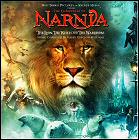 I’ve been ambivalent about the new film version of C.S. Lewis’ classic tale on many levels; for one, despite enjoying some of the past attempts that have been, to put it charitably, steeped in cheese, I’m just not sure this is something that can be accurately committed to the big screen. (Oddly enough, I have the same feeling about Dune – I’ve enjoyed various attempts to put it on film, but I’ve also been more than ready to say “okay, enough” at the next attempt.) This big-budget, big-screen, CGI-filled, Disney-backed version looks like it may actually convey the story satisfyingly. And if the soundtrack, released before the movie’s opening, is any indication, we may actually luck out this time.
I’ve been ambivalent about the new film version of C.S. Lewis’ classic tale on many levels; for one, despite enjoying some of the past attempts that have been, to put it charitably, steeped in cheese, I’m just not sure this is something that can be accurately committed to the big screen. (Oddly enough, I have the same feeling about Dune – I’ve enjoyed various attempts to put it on film, but I’ve also been more than ready to say “okay, enough” at the next attempt.) This big-budget, big-screen, CGI-filled, Disney-backed version looks like it may actually convey the story satisfyingly. And if the soundtrack, released before the movie’s opening, is any indication, we may actually luck out this time.
Harry Gregson-Williams’ score, the main component of the soundtrack release, is gorgeous stuff. From its opening cue, The Blitz, 1940, it’s clear that much of the music will be in a traditional leitmotif mode, but Gregson-Williams still finds plenty of room for originality within that context. “The Blitz, 1940” cleverly uses rumbling, downward portamentos of brass to accompany the bombing of London, sounding almost like diving airplanes (who needs sound effects?). Things get decidedly more modern with “Evacuating London”, which almost sounds like it’s taking a few Enya-inspired pointers from Titanic in places.
Things settle down a bit until we actually step through the wardrobe, at which point the music conveys a great sense of the fantastic and the epic. There are numerous cues which – at least judging by their track titles – are lush, flowing travelogues, making for a very relaxing listen without quite fading into the blandness of background music. Having completely missed a few guesses in past “heard the music before I saw the movie” soundtrack reviews, I’m not even going to try to guess at how well the music fits the film, but it’s great stuff; out of the entire score, I will admit to having kept “The Blitz, 1940” and “The Battle” on repeat play quite a bit.
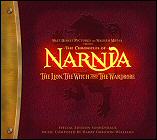 There are four songs included on the tail end of the CD; Alanis Morissette fans will enjoy her track, “Wunderkind”, and I was stunned beyond belief to see Tim Finn turn in a new tune, “Winter Dream” (especially since I’m a fan of his work and hadn’t heard a peep about his participation). (I don’t know who worked the deal to get Tim on this soundtrack or how they did it, but hopefully he benefits from the exposure.) Imogen Heap contributes “Can’t Take It In”, while Lisbeth Scott, the vocalist who can be heard at several points in the score itself, gets a song to herself (“Where”). There’s also a nicely packaged two-disc “special edition” release; the contents of the soundtrack CD are identical, but the package also includes a DVD with interviews with composer Gregson-Williams, concept art galleries and trailers from the movie, and a few other promotional pieces.
There are four songs included on the tail end of the CD; Alanis Morissette fans will enjoy her track, “Wunderkind”, and I was stunned beyond belief to see Tim Finn turn in a new tune, “Winter Dream” (especially since I’m a fan of his work and hadn’t heard a peep about his participation). (I don’t know who worked the deal to get Tim on this soundtrack or how they did it, but hopefully he benefits from the exposure.) Imogen Heap contributes “Can’t Take It In”, while Lisbeth Scott, the vocalist who can be heard at several points in the score itself, gets a song to herself (“Where”). There’s also a nicely packaged two-disc “special edition” release; the contents of the soundtrack CD are identical, but the package also includes a DVD with interviews with composer Gregson-Williams, concept art galleries and trailers from the movie, and a few other promotional pieces.
 All in all, The Lion, The Witch And The Wardrobe gets a very nice orchestral score with some modern touches (though not overpoweringly modern). If you’re looking for a good film score with a balance between action scenes and more contemplative cues, and something that’s not John Williams (nothing against Mr. Williams, but 2005 at the theater has been jam-packed with his music – Revenge Of The Sith, War Of The Worlds, Munich, Memoirs Of A Geisha…), this will do nicely.
All in all, The Lion, The Witch And The Wardrobe gets a very nice orchestral score with some modern touches (though not overpoweringly modern). If you’re looking for a good film score with a balance between action scenes and more contemplative cues, and something that’s not John Williams (nothing against Mr. Williams, but 2005 at the theater has been jam-packed with his music – Revenge Of The Sith, War Of The Worlds, Munich, Memoirs Of A Geisha…), this will do nicely.
- The Blitz, 1940 (2:32)
- Evacuating London (3:38)
- The Wardrobe (2:54)
- Lucy Meets Mr. Tumnus (4:10)
- A Narnia Lullaby (1:12)
- The White Witch (5:30)
- From Western Woods To Beaversham (3:34)
- Father Christmas (3:20)
- To Aslan’s Camp (3:12)
- Knighting Peter (3:48)
- The Stone Table (8:06)
- The Battle (7:08)
- Only The Beginning Of The Adventure (5:32)
- Can’t Take It In performed by Imogen Heap (4:42)
- Wunderkind performed by Alanis Morissette (5:19)
- Winter Light performed by Tim Finn (4:13)
- Where performed by Lisbeth Scott (1:54)
Released by: Walt Disney Records
Release date: 2005
Total running time: 70:44
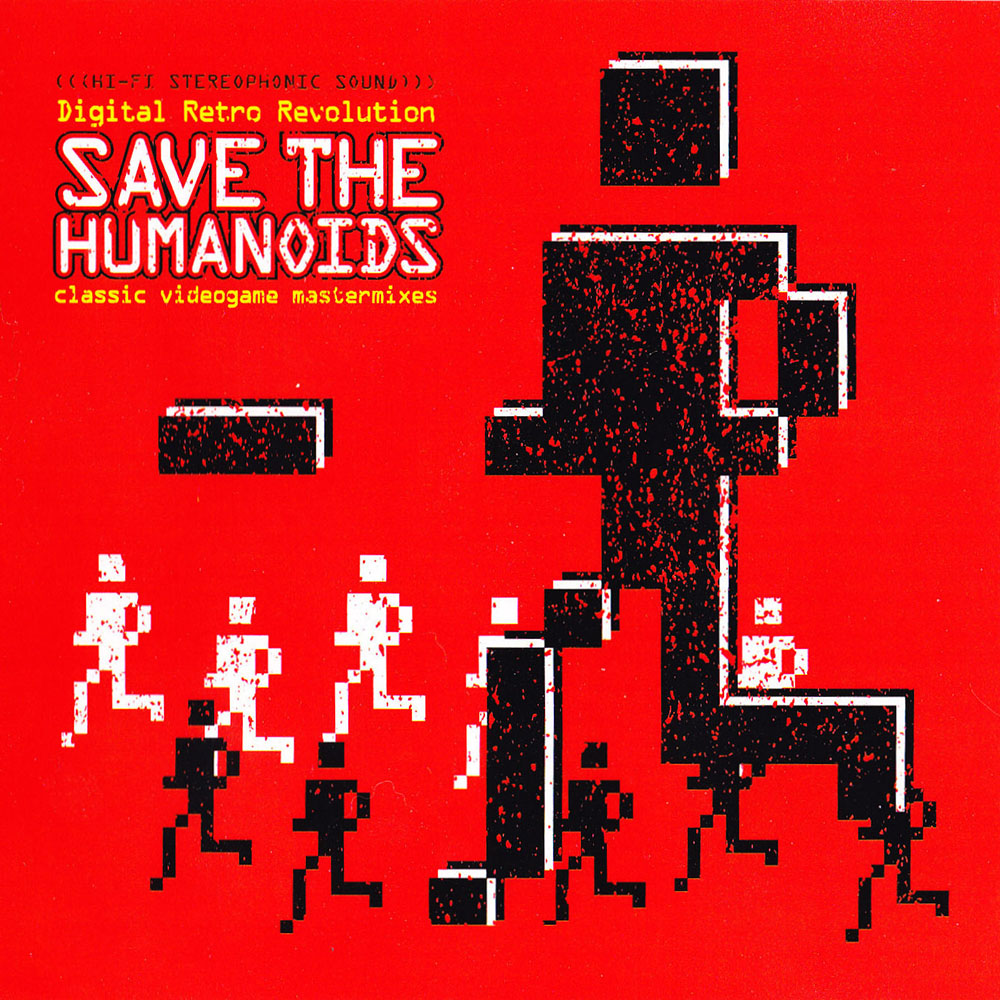
Digital Retro Revolution – Save The Humanoids
Bringing back the remixing mastery of Tony Fox NYC, Digital Retro Revolution picks up where Fox’s I Am Humanoid left off – slammin’ beats, video game samples galore, and frequently-hilarious out-of-left-field samples from other sources punctuating the proceedings.
Save The Humanoids goes further afield than the arcade for its source sounds, however, and hits a whole new level of musicality. “Final Fantasy Laguna Battle Remix” is a great example – it’s a simple enough tune from a classic game, but with added layers of rhythms and other elements, it only enhances the original. Similar treatments built around the simple tunes from games such as Galaga, Crazy Climber and Tron are just as effective. Also included are remixed versions of Buckner & Garcia’s 1982 singles “Pac-Man Fever” and “Do The Donkey Kong”. Man, the fun that could’ve been had with “Froggy’s Lament”…
“Adagio For Humanoids” takes things in the opposite direction, taking non-musical sounds and trying to make  them musical, building Barber’s “Adagio For Strings” out of game samples. And once again, there’s a dandy hidden track straight out of the brassy, Sound of Philadelphia 70s to close things out.
them musical, building Barber’s “Adagio For Strings” out of game samples. And once again, there’s a dandy hidden track straight out of the brassy, Sound of Philadelphia 70s to close things out.
How much you get out of Save The Humanoids will depend a lot on how much you enjoy hearing these samples, but for those who remember these games by heart, this is your soundtrack.
- It’s Wacked Man (Ms. Pac-Man Remix) (3:02)
- BLIP-NOT-TICK (3:12)
- Adagio For Humanoids (5:01)
- CentiMillipede (1:38)
- Save The Humanoids (2:35)
- Go For It! Crazy Climber Remix (1:45)
- Triple Punch Bop (2:15)
- Humanoids & Asteroids (The Buck Out Edit) (3:39)
- GaLaGaLaXiaN (1:32)
- Carnival 2005 (2:18)
- Zelda Vs. The Humanoids (4:05)
- Humanoid Master (Underground Edit) (2:01)
- Stop, Judge (Karate Champ Remix) (2:30)
- Tetris On The Runway (2:47)
- The Lair Of Tron (2:04)
- Pac-Man Fever Remix (4:56)
- Do The Donkey Kong Remix (3:35)
- Robotron: 2005 (3:00)
- Star Humanoid (2:56)
- Final Fantasy Laguna Battle Remix (4:48)
- Hey Porcupine! (Sonic Remix) (1:55)
- Ghouls, Ghosts & Goblins (2:01)
- Knock Him Out! (Hardcore Humanoid Edit) (1:37)
- Humanoids Reprise (3:04)
- ? Hidden Track (3:35)
Released by: Digital Press Records
Release date: 2005
Total running time: 72:01
8-Bit Weapon – The Vaporware Soundtracks
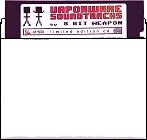 A completely different animal from 2003’s Confidential, Vaporware Soundtracks is the sound of a whole new, completely reloaded 8-Bit Weapon. Rather than remixing classic Commodore 64 game music, 8-Bit Weapon – now consisting of Seth Sternberger and drummer Stacey Superstix – is doing some infectiously catchy original numbers. The odd pairing of “micromusic,” using Commodore computers and a Game Boy Color, with live drumming gives some of this CD’s tracks a fresh surge of power – in fact, I found that on some of the tracks where there were no live drums, the pace almost seems to sag.
A completely different animal from 2003’s Confidential, Vaporware Soundtracks is the sound of a whole new, completely reloaded 8-Bit Weapon. Rather than remixing classic Commodore 64 game music, 8-Bit Weapon – now consisting of Seth Sternberger and drummer Stacey Superstix – is doing some infectiously catchy original numbers. The odd pairing of “micromusic,” using Commodore computers and a Game Boy Color, with live drumming gives some of this CD’s tracks a fresh surge of power – in fact, I found that on some of the tracks where there were no live drums, the pace almost seems to sag.
Unusual instrumental pairings alone don’t make a good album, though – a bunch of good songress do, and this album definitely has ’em. Seth does vocoder-processed vocals on “Arcade” and “One Last Mission”, the latter being the jewel of the whole collection. Played frequently on stage at Classic Gaming Expo 2005, “One Last Mission” is a masterful throwback to the sort of dirge-like electro-pop that nobody’s done this well since Gary Numan was still on the map. Its lyrics are also a perfect calling card for 8-Bit Weapon, a story of losing (and trying to redeem) love, described in terms of an epic gaming session. Stacey gets a moment in the spotlight as well, delivering breathless vocals with just a hint of Lene Lovich on the twitchy “Panty Raid”.
The rest of the album is largely instrumental, though again the percussion gives it a certain “oomph” – when it’s there. Some of the instrumentals come entirely out of the computer with no acoustic backup, and while many of them are lively and fast-paced, they just seem to lack the impact of those tracks with real stick work.
 The new lineup of 8-Bit Weapon has a lot going for it – a great sound that’s not like anything else I’ve heard recently, and some great songs to go with it. If anything, they might want to concentrate on songs that utilize both of their talents, and, it must be said, they’re at their best when playing live. The moment they can capture that same energy in the studio, 8-Bit Weapon will officially be locked, loaded, and maybe just dangerous enough to take on the mainstream.
The new lineup of 8-Bit Weapon has a lot going for it – a great sound that’s not like anything else I’ve heard recently, and some great songs to go with it. If anything, they might want to concentrate on songs that utilize both of their talents, and, it must be said, they’re at their best when playing live. The moment they can capture that same energy in the studio, 8-Bit Weapon will officially be locked, loaded, and maybe just dangerous enough to take on the mainstream.
- GameBoy Rocker (2:53)
- Sk8 Bit (4:03)
- Arcade (4:13)
- Bombs Away! (3:26)
- Panty Raid (3:54)
- Bit ‘n Run (3:49)
- Samurai Princess (3:48)
- Breathe Sleep Dream (3:58)
- Action Kitty In Space (4:32)
- Nature Music (2:54)
- Funk Data (5:41)
- One Last Mission (6:59)
- Satellite (2:20)
- Bit Breaks (demo) (4:21)
- Sk8 Bit (demo) (3:59)
- Hidden Track (4:55)
Released by: 8-Bit Weapon
Release date: 2005
Total running time: 65:45
She Will Have Her Way: The Songs Of Tim & Neil Finn
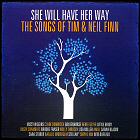 It’s very simple, the premise of this tribute to the music of New Zealand’s premiere pop music exports, Tim and Neil Finn (Split Enz, Crowded House, and respective solo careers and collaborations as the Finn Brothers). The basic idea is this: female or predominantly female acts from Australia and New Zealand reinterpret songs from various stages of the Finns’ careers in their own style. What emerges from that idea is an array of wildly different styles, voices and degrees of fidelity to the source material.
It’s very simple, the premise of this tribute to the music of New Zealand’s premiere pop music exports, Tim and Neil Finn (Split Enz, Crowded House, and respective solo careers and collaborations as the Finn Brothers). The basic idea is this: female or predominantly female acts from Australia and New Zealand reinterpret songs from various stages of the Finns’ careers in their own style. What emerges from that idea is an array of wildly different styles, voices and degrees of fidelity to the source material.
If you’re not from that part of the world, you may not know who virtually all of the performers are (I can relate – prior to this CD, I must confess that I had only heard of Boh Runga and Natalie Imbruglia). But like a lot of “various artists” projects heavy with smaller acts, you’ll probably walk away from the endeavour wanting to sample more of their work. Clare Bowditch’s rendition of “Fall At Your Feet” gets things rolling, and as much as I was faintly disappointed by the fact that the song that gave this album its name wasn’t actually covered, “Fall At Your Feet” serves as a good eye-opener when the unchanged lyric “I’m really close tonight, and I feel myself moving inside her” is sung by a female vocalist. This is an excellent cover too, stripping the song down to basics somewhat and yet retaining so much of its yearning feel.
A few of the covers are almost baffling, but at the same time I admire the reinvention of every single one of them. Renee Geyer transforms “Into Temptation” into a pop song with hip-hop influences, and “Persuasion” and “One Step Ahead” make a successful leap into bubblegum pop territory. Some of the covers don’t stray far from the source material at all – “Won’t Give In”, from the Finn Brothers’ 2004 album, becomes just a little bit country-fried, while the group Little Birdy turns the dense synth textures of “Six Months In A Leaky Boat” into dense guitar textures. “I Hope I Never”, while a bit stripped down from the synth-orchestral arrangement of the 1980 Split Enz version, retains its soaring, wistful vocals thanks to Lisa Miller. “Better Be Home Soon”, which was always written as a ballad reflecting the thoughts of a woman whose significant other is away from home far too often, finally gets to be sung by a woman here.
I’ll admit that I wasn’t crazy about Holly Throsby’s “Not The Girl You Think You Are” remake, but that’s just down to it being not my favorite style of singing; your mileage may vary. “Don’t Dream It’s Over” is a nice cover, but almost strips the song down too much, only to restore it to its full glory by recasting the famous organ solo as a choral piece.
For the most part, the lyrics are left unchanged; a few adjustments are made for gender here and there. I was a little dismayed that “like a Christian fearing vengeance from above” was completely excised from “Distant Sun”; Brooke Fraser’s cover of the song is very nice, but there’s a little voice in my head that says these artists are supposed to be reinterpreting the songs here, not rewriting them. I found this single omission more jarring than any of the more daring stylistic alterations, because it changed what was being said and not how it was being said. (Neil Finn’s recurring “lapsed Catholic” theme is an intriguing thread running through a great many of his songs, and part of the character of his work.) But then maybe I’m being a bit too defensive of the source material there.
There are other ways to drastically change the character of a song, though. Sophie Koh’s reading of the early Enz tune “Charlie” takes the song’s already dark narrative – involving someone waking up from a hangover and realizing that they killed their friend during an argument the night before – and puts a whole different spin on it by making the song fast and fun, leaving the story intact but generating a “crazy chick” vibe that makes it unnerving in a whole new way – as if the person doing the singing isn’t remorseful of what has happened, but is instead blissfully unaware. “Charlie” is almost punk rock in this incarnation, and it may well be the best thing on the CD. I’ll definitely be on the lookout for some of Sophie Koh’s originals. I was surprised by how much I liked Natalie Imbruglia’s take on the Crowded House number “Pineapple Head”, too.
 So, the question is…will you enjoy She Will Have Her Way? I give it a strong recommendation – in particular, even though I didn’t get it (mainly because I’ve already got all of the original albums on which these songs appeared), the 2-CD version which allows you to compare the covers with the original recordings. You might find some of the differences jaw-dropping. In any case, these were great songs to begin with – lyrically and musically outstanding works – and they survive even the wildest changes and still emerge as great songs. Whether you’re a Finn fan daring to try out some different takes on your favorites, or someone just now sampling both these artists and the music of Tim and Neil Finn for the first time, this is a solid collection that’ll keep you coming back for more.
So, the question is…will you enjoy She Will Have Her Way? I give it a strong recommendation – in particular, even though I didn’t get it (mainly because I’ve already got all of the original albums on which these songs appeared), the 2-CD version which allows you to compare the covers with the original recordings. You might find some of the differences jaw-dropping. In any case, these were great songs to begin with – lyrically and musically outstanding works – and they survive even the wildest changes and still emerge as great songs. Whether you’re a Finn fan daring to try out some different takes on your favorites, or someone just now sampling both these artists and the music of Tim and Neil Finn for the first time, this is a solid collection that’ll keep you coming back for more.
- Fall At Your Feet – Claire Bowditch (3:50)
- Stuff And Nonsense – Missy Higgins (3:31)
- I’ll Never Know – Goldenhorse (3:04)
- Into Temptation – Renee Geyer (4:56)
- Six Months In A Leaky Boat – Little Birdy (3:53)
- Better Be Home Soon – Kasey Chambers (3:19)
- Distant Sun – Brooke Fraser (3:56)
- Not The Girl You Think You Are – Holly Throsby (3:37)
- I Hope I Never – Lisa Miller (4:09)
- Don’t Dream It’s Over – Sarah Blasko (4:42)
- One Step Ahead – Amiel (3:01)
- Four Seasons In One Day – New Buffalo (4:00)
- Won’t Give In – Sara Storer (4:18)
- Pineapple Head – Natalie Imbruglia (3:23)
- Persuasion – Stellar* (3:41)
- Charlie – Sophie Koh (3:47)
Released by: EMI
Release date: 2005
Total running time: 61:07
War Of The Worlds – music by John Williams
 John Williams’ War Of The Worlds score is the latest in a long line of John Williams / Steven Spielberg collaborations. Whether one of Spielberg’s summer blockbusters (Jaws, E.T., the Indiana Jones and Jurassic Park trilogies, Close Encounters Of The Third Kind) or one of his more dramatic films (Artificial Intelligence: A.I., Minority Report, Saving Private Ryan and Schindler’s List), Williams’ compositions are an essential component to these films that have added to the emotional impact made by each one of them.
John Williams’ War Of The Worlds score is the latest in a long line of John Williams / Steven Spielberg collaborations. Whether one of Spielberg’s summer blockbusters (Jaws, E.T., the Indiana Jones and Jurassic Park trilogies, Close Encounters Of The Third Kind) or one of his more dramatic films (Artificial Intelligence: A.I., Minority Report, Saving Private Ryan and Schindler’s List), Williams’ compositions are an essential component to these films that have added to the emotional impact made by each one of them.
Throughout the War Of The Worlds soundtrack, Williams takes his time building those emotions and delivers a slow ascension of impending disaster in much the same way the film does. Many of the tracks are as suspenseful and heart pounding as scenes from the film itself. You’ll find no catchy themes to whistle the day after here. War Of The Worlds is a horror film, and the soundtrack directly reflects that.
One unique feature of this soundtrack are the opening and closing monologues performed by Morgan Freeman, reprising his role as the narrator from the film. Pure soundtrack fans may find it annoying, but helps set the tone and mood of the story for those who haven’t seen the film.
Overall the soundtrack is eerie and suspenseful, with a bit of terror thrown in for fun. Some of the tracks (“Escape From The Basket”) take over five minutes to develop, building suspense the entire time. Other tracks, like “Escape From The City”, climax quickly and convey the terror and panic from the film’s action scenes.
 Unfortunately the soundtrack, whiile technically impressive, isn’t very entertaining to listen to on its own. The lack of repeating themes or memorable catches will keep it off most people’s favorite lists. As a soundtrack it’s great, as a stand alone album it’s only good.
Unfortunately the soundtrack, whiile technically impressive, isn’t very entertaining to listen to on its own. The lack of repeating themes or memorable catches will keep it off most people’s favorite lists. As a soundtrack it’s great, as a stand alone album it’s only good.
- Prologue (2:52)
- The Ferry Scene (5:49)
- Reaching The Country (3:24)
- The Intersection Scene (4:12)
- Ray And Rachel (2:41)
- Escape From The City (3:49)
- Probing The Basement (4:12)
- Refugee Status (3:51)
- The Attack On The Car (2:44)
- The Separation Of The Family (2:36)
- The Confrontation With Ogilvy (4:33)
- The Return To Boston (4:29)
- Escape From The Basket (9:24)
- The Reunion (3:16)
- Epilogue (3:11)
Released by: Decca
Release date: 2005
Total running time: 61:07
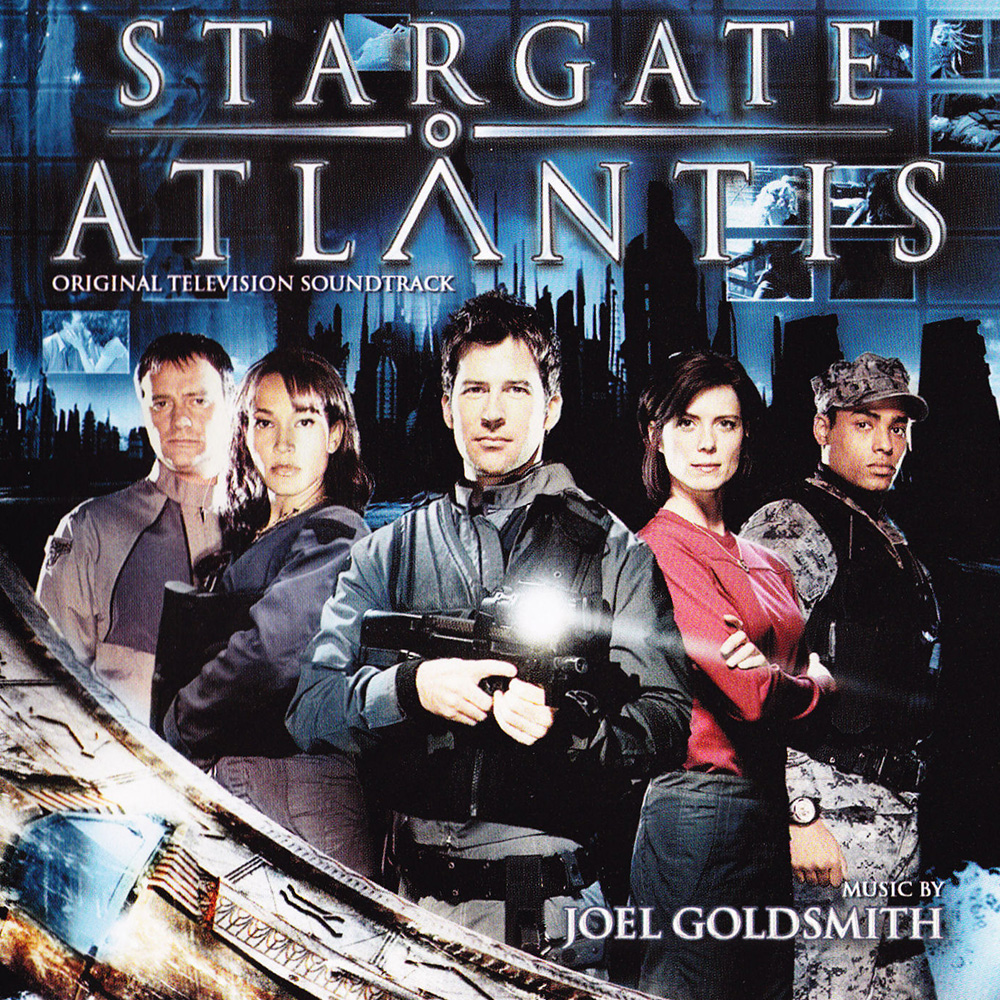
Stargate Atlantis – music by Joel Goldsmith
 Launched in 2004 to an audience eager for even more Stargate adventures, Stargate Atlantis chronicles the adventures of a multi-national team of explorers from Earth who take up residence in a remarkably well-preserved oceanic city left behind the stargate-building race known only as the Ancients, finding themselves under attack from the same villains who drove the Ancients from that city millennia ago. With a cast of brand new characters (and one or two holdovers from SG-1), and numerous holdovers on the behind-the-scenes side of things, Atlantis proved to be a ratings success for the Sci-Fi Channel.
Launched in 2004 to an audience eager for even more Stargate adventures, Stargate Atlantis chronicles the adventures of a multi-national team of explorers from Earth who take up residence in a remarkably well-preserved oceanic city left behind the stargate-building race known only as the Ancients, finding themselves under attack from the same villains who drove the Ancients from that city millennia ago. With a cast of brand new characters (and one or two holdovers from SG-1), and numerous holdovers on the behind-the-scenes side of things, Atlantis proved to be a ratings success for the Sci-Fi Channel.
One of the creative personnel doing double duty on both shows every week is Joel Goldsmith, who has been the primary composer for SG-1 since its premiere. With Stargate Atlantis, Goldsmith finally gets to spread his wings and fly – more specifically, fly away from the themes and tone established by David Arnold in the original theatrical version of Stargate ten years ago. The adventure and the bombast are still there, but Goldsmith is no longer beholden to using Arnold’s music as a motif. Nowhere is this as evident as it is with the Emmy-nominated main title, easily the most gorgeous orchestral theme tune to hit TV since Goldsmith’s father Jerry took the podium to conduct the Star Trek: Voyager theme. The Atlantis theme is absolutely thrilling, soaring and heroic stuff with a choral middle section to die for (despite the fact that it seems to be a slight musical homage to the main theme from Star Blazers / Space Battleship Yamato). Why this theme lost the Emmy to Danny Elfman’s Desperate Housewives theme is probably just down to the name “Danny Elfman” – Atlantis has one of the best TV themes of recent years, hands-down. (Sci-Fi Channel, naturally, showed their appreciation by cutting it down to ten seconds for the first half of season two, ostensibly to sell more commercial time.)
The rest of the CD – containing cues from the score to the two-hour pilot episode The Rising – has music in a similarly sumptuous vein. Not all of it is necessarily full orchestral treatment though – “Messages”, covering a montage in which the various crew members say their goodbyes to their loved ones, is low-key and piano-driven (and still sneaks the main theme in there as a motif). And you can even hear a nod to David Arnold as the Stargate/SG-1 theme plays briefly during “Atlantis Wakes”.
If you’re looking for action cues, you’re in luck – “Rogue Drone” and “Dart Battle” should keep you very happy. And those with leanings toward horror movie music, just about any track with the word “Wraith” in the title is your ticket. In the end, I really find myself skipping only one track – “Tayla’s Village”, which gives the  relatively primitive setting of that locale a very typical mixture of light tribal percussion and Celtic instrumentation that just doesn’t seem to fit what’s supposed to be an alien culture.
relatively primitive setting of that locale a very typical mixture of light tribal percussion and Celtic instrumentation that just doesn’t seem to fit what’s supposed to be an alien culture.
Overall, the Stargate Atlantis soundtrack will be a big hit with fans of the show, though I can give it a hearty thumbs-up for anyone who’s missing a bit of the old orchestral bombast in their SF TV scoring.
- Main Title (1:04)
- Atlantis Takes Flight (1:41)
- Rogue Drone (2:29)
- Messages (2:29)
- Weir Speaks (2:28)
- Gate To Atlantis (2:28)
- Atlantis Wakes (3:32)
- Tayla’s Village (1:13)
- Wraith Abductions (3:19)
- The Hologram (2:15)
- The Rising (3:41)
- Wraith Lair (5:20)
- Dart Battle (3:29)
- The Rescue (2:35)
- O’Neill Inbound (1:24)
- Our New Home, Atlantis (2:01)
Released by: Varese Sarabande
Release date: 2005
Total running time: 42:11
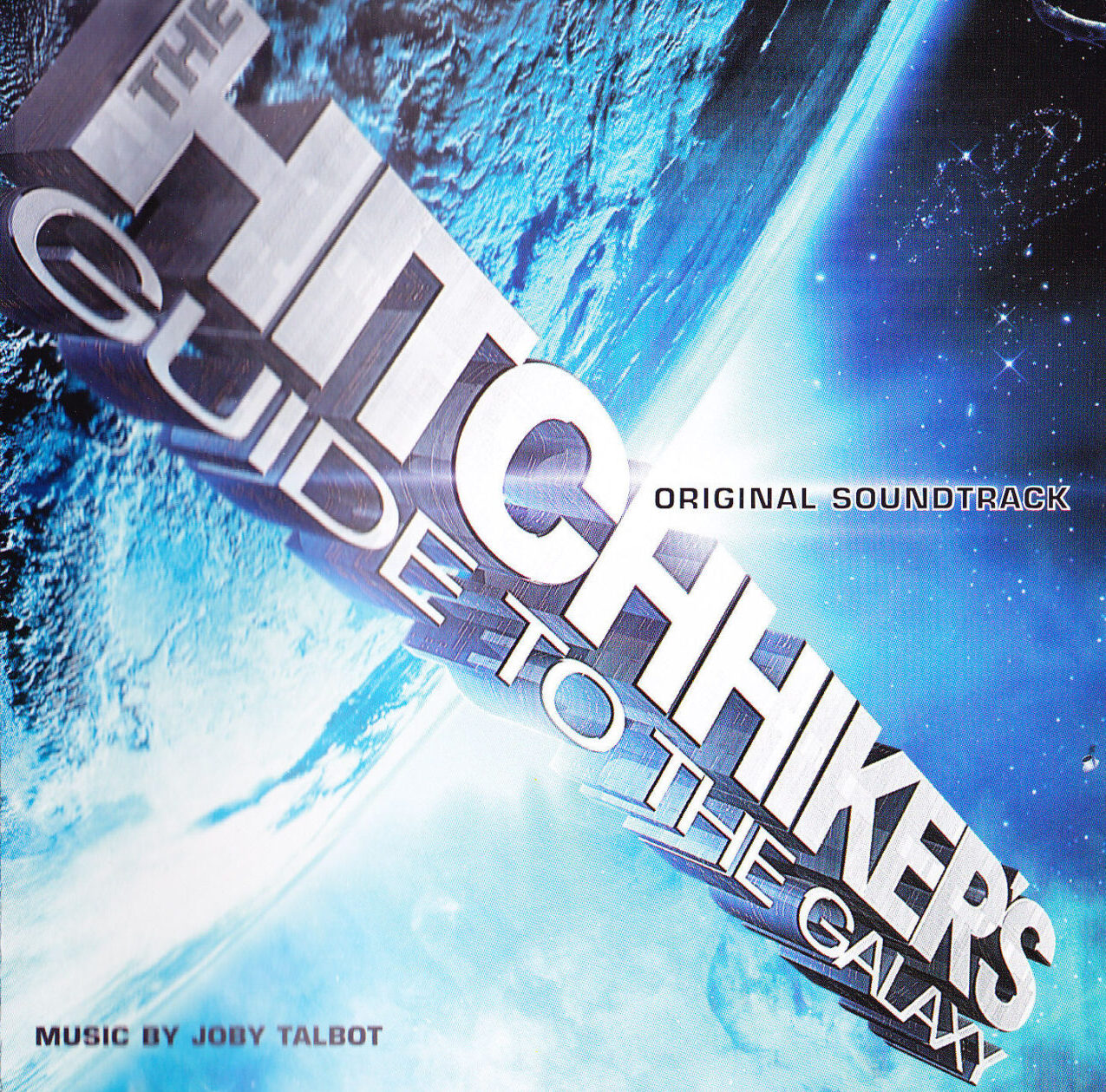
Hitchhiker’s Guide To The Galaxy – music by Joby Talbot
A quintessentially British film of a quintessentially British story, The Hitchhiker’s Guide To The Galaxy gets – for the most part – a surprisingly traditional orchestral treatment from a composer who has been involved with other quintessentially British projects. Joby Talbot, who provided the music for the TV series The League Of Gentlemen (as well as for the League’s big-screen debut), had a lot of masters to serve when creating the music for Hitchhiker’s Guide, and did his best to please them all.
Hitchhiker’s Guide actually has quite a rich musical history, from the use of existing works in the original BBC Radio series to the completely original, largely electronic music composed by Paddy Kingsland of the BBC Radiophonic Workshop for the short-lived TV series. Talbot manage to strike a balance between these and a more traditional SF-a-la-Hollywood approach nicely; the long legacy of Hitchhiker’s Guide is acknowledged by a nice new rendition of the Eagles’ “Journey Of The Sorcerer”, which has been the de facto theme song of the Guide since its first radio performance in 1978. For those segments of the movie which show entries from the Guide itself, Talbot is ably assisted by Nigel Godrich (who produced Radiohead’s OK Computer and worked on Jason Falkner’s Can You Still Feel?) in creating almost-retro synthesized cues that emphasize the animation and inject a bit of “Don’t Panic” levity into the proceedings.
One of the things that struck me so vividly upon first seeing the movie was the big, boisterous, movie-musical-style opening song “So Long, And Thanks For All The Fish”. Even without the dolphin visuals, it’s a striking way to open the movie, and quite frankly, it does an incredible job of straddling the line between what one would usually expect from a musical showpiece and offering a musical prelude to the end of the Earth. Its opening measures are jaunty and deceptively cheerful in doom-laden minor keys, a brilliant piece of musical storytelling (and misdirection). That tune recurs throughout the score.
One of the hardest things to judge about a movie score is whether or not it works away from the movie. It can still be great music, and film music isn’t always necessarily designed to be heard away from its accompanying visuals, but sometimes a score comes along that doesn’t make for the most satisfying stand-alone listening material. Hitchhiker’s, ultimately, falls into that latter category. There are several cues that make one sit up and take notice, but they’re the punctuation at the end of what sometimes amounts to fairly long musical sentences. I don’t ask that every soundtrack album out there should be wall-to-wall action cues, either. But some stretches of Hitchhiker’s Guide mean that this isn’t a soundtrack that stands up to all-in-one-sitting listening.
 That said, there is some good stuff on here. Bringing up the rear as the last track is a real surprise, a remake of the original “Marvin” single “Reasons To Be Miserable”. Written by Douglas Adams himself (and originally performed circa 1980 by Stephen Moore), this is a more modern remake told in the third person by the new voice of the Guide, Stephen Fry. While I still prefer the original to this version, the fact that the song is even here is just another indication that the folks behind Hitchhiker’s Guide really did look back on the story’s origins with reverence. This soundtrack is a worthy addition to the canon.
That said, there is some good stuff on here. Bringing up the rear as the last track is a real surprise, a remake of the original “Marvin” single “Reasons To Be Miserable”. Written by Douglas Adams himself (and originally performed circa 1980 by Stephen Moore), this is a more modern remake told in the third person by the new voice of the Guide, Stephen Fry. While I still prefer the original to this version, the fact that the song is even here is just another indication that the folks behind Hitchhiker’s Guide really did look back on the story’s origins with reverence. This soundtrack is a worthy addition to the canon.
- The Dolphins (1:00)
- So Long And Thanks For All The Fish (2:26)
- Arthur Wakes Up (2:53)
- Shoo-Rah! Shoo-Rah! performed by Betty Wright (2:51)
- Here I Am (Come And Take Me) performed by Al Green (4:13)
- Destruction Of Earth (1:31)
- Journey Of The Sorcerer (1:15)
- The Hitchhiker’s Guide To The Galaxy (1:14)
- Inside The Vogon Ship (2:46)
- Vogon Poetry (0:48)
- Space (1:00)
- Vogon Command Centre (1:00)
- Trillian & Arthur Reunited (1:45)
- Pan Galactic Gargle Blaster (1:40)
- Tea In Space (1:08)
- Deep Thought (2:06)
- Infinite Improbability Drive (0:55)
- Viltvodle Street Music (0:45)
- Huma’s Hymn performed by Gabriel Crouch (1:02)
- Capture Of Trillian (4:27)
- Vogcity (1:02)
- Love (1:44)
- The Whale (1:53)
- Planet Factory Tour (2:29)
- Earth Mark II (6:29)
- Magic Moments performed by Perry Como (2:37)
- Shootout (3:23)
- Finale (1:50)
- Blast Off (0:16)
- So Long And Thanks For All The Fish (Reprise) (2:54)
- Careless Talk (1:42)
- Vote Beeblebrox (3:27)
- Reasons To Be Miserable performed by Stephen Fry (3:37)
Released by: Hollywood Records
Release date: 2005
Total running time: 70:08
Meco – Star Wars Party
 Twenty-seven years after his first Star Wars-themed album, Music Inspired By Star Wars And Other Galactic Funk, Meco Monardo returns in time for the release of the final Star Wars film, Revenge of the Sith. This album of (mostly) new material, Star Wars Party, has a very different feel to Meco’s Star Wars work of old.
Twenty-seven years after his first Star Wars-themed album, Music Inspired By Star Wars And Other Galactic Funk, Meco Monardo returns in time for the release of the final Star Wars film, Revenge of the Sith. This album of (mostly) new material, Star Wars Party, has a very different feel to Meco’s Star Wars work of old.
Rather than go the direct disco route, the covers on Star Wars Party see Meco stretching into wildly differing directions. “I Am Your Father” is a trance-like dance track. “Star Wars Love Themes” melds cues from both trilogies into an odd march-like affair. “New Star Wars” is basically Meco’s modern take on a dance version of the main Star Wars theme, with lots of samples. “The Empire Strikes Back” is not really a new track, but a remix of the 1980 original that basically adds new sound effects to the mix. (I question the wisdom of including this track, since it basically outclasses the new covers completely.) “You Are Reckless” is a rambling hodge-podge of Star Wars music overdubbed with Yoda dialogue. “Lapti Nek” is certainly the best of the new crop; a decent rendition of the now redundant Max Rebo track, with solid use of dialogue sampling that doesn’t distract from the song.
The original tracks “Star Wars Party”, “Jedi Knight” and “Live Your Life” are lightweight fluff pieces that can’t stand up alongside even the questionable quality of the covers. The lyrics are absolutely atrocious (and not in a good way) and while the music is not horrible, neither is it memorable.
But the biggest problem with Star Wars Party isn’t Meco’s unusual musical choices or his lousy lyrics and simplistic original music, it’s his reliance on dialogue clips. While his choice of dialogue is fine and how he chooses to use it within a song is usually spot on, the problem is that only about a third of the clips are authentic (or at least close enough not to matter). It’s jarring hearing unknown voices speaking such classic lines (and then to hear them sampled over and over again). The worst are the people speaking Han and Leia’s lines in “Star Wars Love Themes” and the grating fake Yoda sprinkled throughout the CD. To make matters worse, there will often be authentic dialogue right next to these poor imitations, making the failure more glaring than it otherwise might be. If Meco wanted all these voice samples, he should have gotten clearance to use only original dialogue or given up on the idea.
But just when it seems that Star Wars Party will inevitably wind up filed somewhere between useless and unnecessary, we come to the final track on the disc, “Boogie Wookie”. Silly as its title may sound, it’s a lush disco dance track that is as close to the perfection Meco achieved on the original Galactic Funk album as Star Wars Party gets. With a generous sprinkling of Wookie dialogue throughout and no real lyrics to speak of, Meco falls into none of the traps that damage the other tracks. I won’t go so far as to say that “Boogie Wookie” is good enough to make me recommend this disc, but I found it good enough to justify the purchase to myself, at least.
Star Wars Party doesn’t live up to the legacy of Meco’s classic work from the golden age of Star Wars, but it isn’t a complete disaster. The remix of “Empire” is pretty good (but expendable) and “Boogie Wookie” and the “Lapti Nek” cover deserve attention. The other tracks have little value (and what value they have is mostly destroyed by the awful voice sampling). Ultimately, your enjoyment of Star Wars Party will likely be determined by how far three good tracks can take you.

Note: Star Wars Party was simultaneously released under the alternate title Music Inspired By Star Wars. Both are available for purchase, but Star Wars Party is only available from Amazon.com and CDbaby.com. All other online retailers and brick and mortar stores sell only Music Inspired by Star Wars.
- I Am Your Father (3:07)
- Star Wars Party (3:10)
- Star Wars Love Themes (4:00)
- New Star Wars (3:07)
- The Empire Strikes Back (3:30)
- You Are Reckless (3:05)
- Jedi Knight (4:03)
- Lapti Nek (3:23)
- Live Your Life (3:18)
- Boogie Wookie (6:24)
Released by: Mecoman Productions
Release date: 2005
Total running time: 37:43
Depeche Mode – Playing The Angel
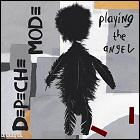 One doesn’t listen to music by Depeche Mode to get happy.
One doesn’t listen to music by Depeche Mode to get happy.
That said, there’s something about Playing The Angel that almost makes me break out in a grin. Depeche Mode is back and in fine form on this album marking the band’s 25th anniversary. Unusually, there’s a mix of songs written by Martin Gore (who’s been the dominant songwriter for much of the band’s career) and lead singer David Gahan, but Gahan’s tunes aren’t filler material begrudgingly added to boost the songwriter’s ego. At least one of them, “Suffer Well”, is as good as many of the songs that most longtime fans now consider to be classics. To be fair, though, Gore turns out some of his best songs since Violator here, with the rollicking “John The Revelator”, “Precious” and the slow-boiling “Sinner In Me” standing out from the crowd. (It’s worth nothing, however, that “Macro” is quite possibly the weakest song Martin Gore has ever unleashed on a Depeche Mode album, combining an uninspired melody with jaw-droppingly trite lyrics – I wouldn’t make such a stink about one song normally, but it’s just so shocking since I’m used to his work being both more musical and more eloquent than this.)
 The whole thing thunders along with a combination of modern rhythms and very analog synthesizers, and more assured vocals from David Gahan than I’ve heard in ages. The decision to lean so heavily on analog synths prevents a lot of the sound from being obviously dated, though there are enough modern elements that no one will be mistaking this album for Some Great Reward anytime soon. The distorted, crunchy guitar work is front and center on several songs – in fact, “Sinner In Me” doesn’t really properly kick in until the guitar appears. All in all, it adds up to a very satisfying listen and a fitting celebration of a quarter-century on the musical map for Depeche Mode.
The whole thing thunders along with a combination of modern rhythms and very analog synthesizers, and more assured vocals from David Gahan than I’ve heard in ages. The decision to lean so heavily on analog synths prevents a lot of the sound from being obviously dated, though there are enough modern elements that no one will be mistaking this album for Some Great Reward anytime soon. The distorted, crunchy guitar work is front and center on several songs – in fact, “Sinner In Me” doesn’t really properly kick in until the guitar appears. All in all, it adds up to a very satisfying listen and a fitting celebration of a quarter-century on the musical map for Depeche Mode.
- A Pain That I’m Used To (3:57)
- John The Revelator (3:41)
- Suffer Well (3:49)
- The Sinner In Me (4:55)
- Precious (4:10)
- Macro (4:02)
- I Want It All (6:09)
- Nothing’s Impossible (4:21)
- Introspectre (1:42)
- Damaged People (3:27)
- Lilian (4:44)
- The Darkest Star (6:38)
Released by: Mute
Release date: 2005
Total running time: 51:35
Daniel Gannaway – Summer Storm
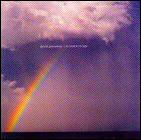 Many times, an album has been sparked by an artist’s discovery/rediscovery of a new or unusual instrument, and sometimes it’s worked (Todd Rundgren’s A Capella experiment of the human voice as every instrument) and just as many times it hasn’t. This is one of those times where it really works. New Zealand-based indie rocker Daniel Gannaway constructed this somewhere-between-EP-and-LP-length collection on a simple premise: every song would feature the ukelele in some fashion. (Yes, you read right, the ukelele.) Recorded in NZ and Hawaii, Summer Storm takes that premise, and the instrument itself, through several permutations, and it all manages to work, largely thanks to Gannaway’s reliable gifts in the songwriting department. Oddly enough, and this isn’t a crack about originality or the lack thereof, the ukelele’s role here reminded me of the shock value of the mandolin as a lead instrument in R.E.M.’s “Losing My Religion”. It’s front and center on every song, though the tone of the songs shifts from light and breezy (“Across The Sea”, which reminded me curiously of early, pre-electric Split Enz) to more straight-ahead rock (“Talking Story”, which was the song that made me think of the “Losing My Religion” comparison in the first place), with stops at several stylistic destinations in between. Someone’s clearly having fun putting
Many times, an album has been sparked by an artist’s discovery/rediscovery of a new or unusual instrument, and sometimes it’s worked (Todd Rundgren’s A Capella experiment of the human voice as every instrument) and just as many times it hasn’t. This is one of those times where it really works. New Zealand-based indie rocker Daniel Gannaway constructed this somewhere-between-EP-and-LP-length collection on a simple premise: every song would feature the ukelele in some fashion. (Yes, you read right, the ukelele.) Recorded in NZ and Hawaii, Summer Storm takes that premise, and the instrument itself, through several permutations, and it all manages to work, largely thanks to Gannaway’s reliable gifts in the songwriting department. Oddly enough, and this isn’t a crack about originality or the lack thereof, the ukelele’s role here reminded me of the shock value of the mandolin as a lead instrument in R.E.M.’s “Losing My Religion”. It’s front and center on every song, though the tone of the songs shifts from light and breezy (“Across The Sea”, which reminded me curiously of early, pre-electric Split Enz) to more straight-ahead rock (“Talking Story”, which was the song that made me think of the “Losing My Religion” comparison in the first place), with stops at several stylistic destinations in between. Someone’s clearly having fun putting  the ukelele through its paces, though again, the songs are the key – they’re all good enough on their own, unusual arrangements or not, to stand up. But any preconceptions you have about the ukelele in terms of strumming away at old tropical island tunes may not stand up after you hear this one – in a few places, it’s some real rock ‘n’ roll. If you’re in the mood for something different, this is some good stuff.
the ukelele through its paces, though again, the songs are the key – they’re all good enough on their own, unusual arrangements or not, to stand up. But any preconceptions you have about the ukelele in terms of strumming away at old tropical island tunes may not stand up after you hear this one – in a few places, it’s some real rock ‘n’ roll. If you’re in the mood for something different, this is some good stuff.
- Across The Sea (2:28)
- In Heaven (2:56)
- Doug’s Little Love Shack (2:35)
- No Mall At Sharks Cove (2:49)
- Talking Story (2:24)
- Silver Lining (3:01)
- A Just Senator (2:53)
- Summer Storm (3:19)
Released by: Daniel Gannaway
Release date: 2005
Total running time: 22:25
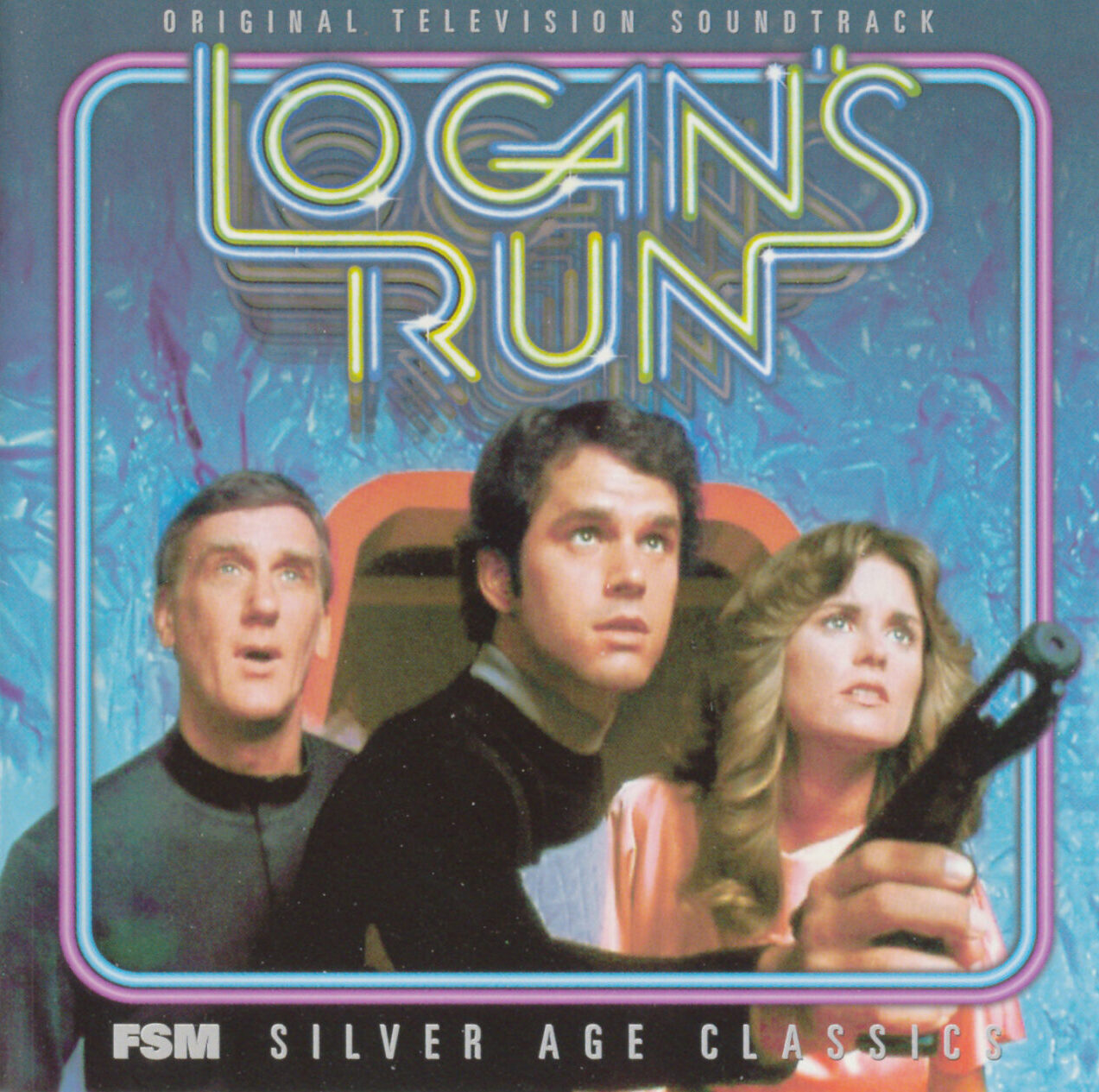
Logan’s Run: The Series
It’s hard to follow Jerry Goldsmith. Take Star Trek: Voyager, for example – each week, Goldsmith’s sweeping theme would often be followed by something that, despite the valiant efforts of the composers who scored each episode (and due to the restraints imposed on them by the show’s producers), simply couldn’t be in the same league. When MGM decided to continue the story of Logan’s Run on the small screen in the late 1970s, the decision was made to “reboot” the story – to essentially retell the movie in a different context that would lead seamlessly into an ongoing series of adventures. The main roles were recast, and so too was the music; gone were the futuristic city setting and Jerry Goldsmith’s avant-garde electronics, replaced by something much more traditional and, perhaps, not a million miles away from Fantasy Island (a thought that I had before opening the liner notes booklet and seeing that composer Bruce Broughton, who scored other episodes represented on this CD, said the same thing). This CD from Film Score Monthly presents the highlights from the entire series, written by several different composers.
Laurence Rosenthal was tapped for the extended-length pilot, several early episodes, and the theme music that would open every subsequent episode. The difference between all of the music on this CD and the score to the movie that inspired the series is stark – where the movie score achieves a little bit of timelessness through unusual instrumentation and unconventional musical thinking, the TV scores are clearly rooted in the pre-Star Wars 1970s. To a greater or lesser extent, depending on who composed it, virtually every track references Rosenthal’s main theme, but instead of being used as an adaptable leitmotif, the theme is quoted almost in its entirety every time it appears.
The theme itself is a snapshot out of time, with a Yamaha organ providing an electronic “siren” effect that, to put it lightly, hasn’t exactly aged gracefully. (It almost sounds like someone had a hot game of Asteroids going during the recording session.) And that’s about as electronic as this iteration of Logan’s Run gets.
The episode score suites do occasionally bear a certain similarity to some of the movie’s action cues, however, particularly those by Rosenthal himself. Bruce Broughton contributes a couple of decent tracks from two of his episodes, two more tracks are from Jerrold Immel’s score, and another track features score music by Jeff Alexander. The rest of the music is by Rosenthal, including a brief selection of “commercial break bumpers” that heralded a commercial interruption.
Now, I’m not judging this music solely on its similarity or lack thereof to a movie score by Jerry Goldsmith; the TV series was aimed squarely at family viewing time, and as such it’s pitched as a whole different animal. But it’s hard not to have the comparison in the back of one’s mind – how much more different could two projects bearing the same name and underlying premise be? The music itself is pleasant enough, though occasionally the age of the source material shows where audio fidelity is concerned. But in the end, there’s a phrase in a paragraph in the booklet describing one of the tracks, explaining that the track is comprised of brief excerpts of a score that wouldn’t have stood up to extended CD listening. To a certain degree, that applies to this CD as a whole. It’s neat to have another vintage SF series musically unearthed and lavished with packaging that’s as informative as it is attractive (Film Score Monthly is the best in the business at that), but as a listening experience, it’s an exercise in how well some music dates…and how well some doesn’t.
 I can really only recommend this one to fans of the show – a show which, I’ll admit, I barely remember myself. Though the liner notes booklet, whose extensive episode guide reveals that such luminaries as D.C. Fontana, David Gerrold, Shimon Wincelberg and even Harlan Ellison worked on the series, makes me hope that a DVD release is in the planning stages somewhere; maybe then I’ll have a better appreciation of this version of Logan’s Run, and its music.
I can really only recommend this one to fans of the show – a show which, I’ll admit, I barely remember myself. Though the liner notes booklet, whose extensive episode guide reveals that such luminaries as D.C. Fontana, David Gerrold, Shimon Wincelberg and even Harlan Ellison worked on the series, makes me hope that a DVD release is in the planning stages somewhere; maybe then I’ll have a better appreciation of this version of Logan’s Run, and its music.
- Main Title (1:11)
- Pilot Suite, Part 1 (8:43)
- Pilot Suite, Part 2 (6:18)
- Pilot Suite, Part 3 (7:47)
- Bumpers (0:10)
- The Collectors (4:10)
- Capture (music by Jeff Alexander) (5:56)
- The Innocent (music by Jerrold Immel) (6:29)
- Man Out Of Time (9:06)
- Half Life (music by Jerrold Immel) (8:46)
- Fear Factor (music by Bruce Broughton) (11:39)
- Futurepast (6:40)
- Night Visitors (music by Bruce Broughton) (1:55)
- End Title (0:38)
Released by: Film Score Monthly
Release date: 2004
Total running time: 79:55
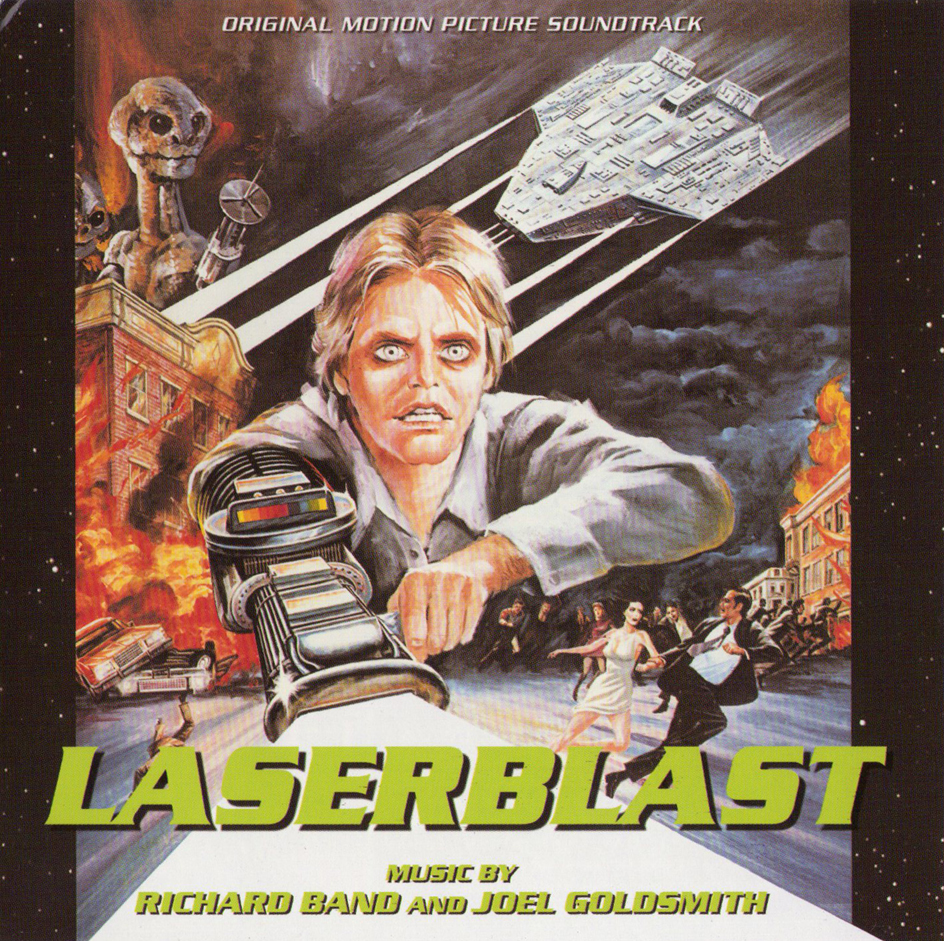
Laserblast – music by Richard Band & Joel Goldsmith
Regarded with fondness perhaps only by one core group of fans, the low-budget 1978 sci-fi-horror flick Laserblast offered the first “real gig” for two names who have become frequent flyers in the music credits of many a TV series and movie today: Richard Band and Joel (Stargate SG-1) Goldsmith. Both young, brimming with ideas, and enthusiastic about their first swipe at the big screen, Goldsmith and Band poured themselves into their work. The bad news is that the movie they were scoring is now generally remembered only as the cinematic victim of the final episode of Mystery Science Theater 3000 on Comedy Central.
Trying to split the different between 70s funk/rock sensibilities and a more traditional underscore, the music from Laserblast might come across as a bit schizophrenic upon the first listen. But in the end, it could be that, aside from one of MST3K’s finest (two) hours, this movie’s greatest contribution was its music. Heard independently of the film itself, Laserblast’s score shows a lot of inventiveness on the part of its composers. Despite working with limited, pre-MIDI synthesizers (and trying to use them to approximate a larger ensemble), Band and Goldsmith, at least, aren’t going through the motions. (With the benefit of hindsight, one can imagine a scene where the two might look at each other with a “what the hell?” shrug and phone the rest of the music in, but that doesn’t seem to have happened.)
Even the source music and rock cues are intersting enough to merit a repeat listen. Be ready for a trip back to the 70s, though – these pieces ooze 70s.
This is the first CD I’ve bought from BuySoundtrax.com, yet another small boutique label catering to movie music fans, and I have to compliment them on this release; the booklet is well-researched and informative, the music itself is sharp and clear, and when it came to the limited autographed edition (100 of the 1,000 copies released were signed), a separate copy of the booklet was  signed. If you frame your autographs, this means that you didn’t just lose your CD booklet to a frame on the wall. Overall, a nice package, and if you can overlook the movie’s dubious pedigree (and try not to hear the voice of Tom Servo singing “There’s a place in France…” over that one track), there’s some decent music in there too.
signed. If you frame your autographs, this means that you didn’t just lose your CD booklet to a frame on the wall. Overall, a nice package, and if you can overlook the movie’s dubious pedigree (and try not to hear the voice of Tom Servo singing “There’s a place in France…” over that one track), there’s some decent music in there too.
- Laserblast Main Title (1:55)
- Mom’s Leaving (0:21)
- Billy’s Radio #1 (2:06)
- Grandpa and Kathy (0:47)
- Billy’s Radio #2 (3:14)
- Deputy Chase (1:16)
- Chuck’s Radio #1 (2:21)
- Alien Blaster / Billy Finds Gun / First Laserblasting (1:46)
- Billy and Kathy (1:14)
- Aliens In Ship / Alien Boss On Screen (0:47)
- Tony Discovers Black Spot (1:02)
- Party Music (4:25)
- Love Theme After Fight (0:46)
- Billy In Mirror / Chuck Goes To Car (1:04)
- Chuck’s Car Gets Blasted (1:06)
- Tony Arrives At Police Station (0:34)
- Operation Montage / Dr. Mellon Examines Billy (1:07)
- Lab Montage (1:11)
- Billy At Gas Station (1:39)
- Billy and Kathy Make Love (0:45)
- More Laserblasting (0:59)
- Chuck’s Radio #2 (3:59)
- Billy Battles Plane (2:54)
- Billy Blows Town Up (5:22)
- Laserblast End Title (2:29)
Released by: BSX Records
Release date: 2005
Total running time: 46:14

Lexx: The Series – music by Marty Simon
 Picking up deftly where the first “season” left off (in more ways than one), Marty Simon’s selection of music from the second and third years of the series gives both something new, and more of the same.
Picking up deftly where the first “season” left off (in more ways than one), Marty Simon’s selection of music from the second and third years of the series gives both something new, and more of the same.
On the “more of the same” front, there’s the fact that the various iterations of the theme music leaned entirely on elements from that first season. It’s interesting to hear two or three pieces of the first season’s music stuck into a blender, set on pureè, and compressed into a minute or so, but the elements are still distinctive and recognizable.
While there are comedy cues here (and, every soundtrack fan’s favorite thing in the world, dialogue from the show), this CD’s focus is on the more dramatic and introspective moments of the second and third seasons. This means some very distinctive and enjoyable material (“Prince To Lexx” and the eerie Lyekka theme, to name just two) as well as some music that, without its visual accompaniment, doesn’t make the most satisfying stand-alone listening experience. On the humorous side, we get “Wild Wild Lexx” and “All He Wants Is Sex”, though I was a bit less enamoured of Xev’s song from Lafftrak. Very, very conspicuous by its absence is anything from the musical episode Brigadoom, an omission that left me slack-jawed in surprise. One wonders if a whole CD devoted to that episode was perhaps planned and scrapped.
Also heard here are all of the opening title medleys from the second and third season (I say “all” because the title music changed in the second season after the change of lead actress).
It’ll all be a treat for devoted Lexx fans, though the stand-alone listening experience varies from track to track  (depending on how much you like songs with vocals in your soundtracks, or show dialogue dropped into the music, though it’s worth noting that the original Tales From A Parallel Universe soundtrack was also guilty of the latter). For those wanting to sample the music of Lexx without the dedicated fan’s knowledge of the show, however, I’d recommend that earlier release over this one.
(depending on how much you like songs with vocals in your soundtracks, or show dialogue dropped into the music, though it’s worth noting that the original Tales From A Parallel Universe soundtrack was also guilty of the latter). For those wanting to sample the music of Lexx without the dedicated fan’s knowledge of the show, however, I’d recommend that earlier release over this one.
- Opening Theme – Season 3 (1:02)
- 790 Quote (0:18)
- Prince To Lexx (2:20)
- All He Wants Is Sex (2:38)
- Angel Song (1:38)
- A Walk In The Desert (4:15)
- Seduction (0:58)
- Wild, Wild Lexx (3:42)
- Galley (2:41)
- Opening Theme – Season 2, Version 1 (1:03)
- Holograms (2:54)
- The Search (3:10)
- Xev’s Dream (4:13)
- Garden (6:33)
- Lexx Hungry (0:17)
- Into The Garden (1:36)
- Lyekka / Potato Hoe (4:58)
- Gondola Ride (4:47)
- Mantrid Medley (3:49)
- Prince Theme (2:01)
- Medieval Dance (1:38)
- Girl Awakes / Norb Launch (1:48)
- The Xev Show (0:32)
- Demented Chase (2:29)
- Yo-A-O / I’m Leaving (1:06)
- Zev Dies (2:23)
- Final Scene (1:42)
- Opening Theme – Season 2, Version 2 (1:27)
Released by: GNP Crescendo
Release date: 2001
Total running time: 77:58
Royksopp – The Understanding
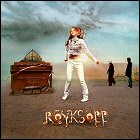 Royksopp’s debut album, the mesmerizing Melody A.M., made enough waves to get attention outside of dance music circles, and in the weeks leading up to the release of The Understanding, I found myself wondering if the Norwegian duo’s first outing might not be as much a curse as a blessing – raising expectations too high for the follow-up. The good news is, The Understanding isn’t Melody A.M. Part 2, nor is it even trying to be. It takes off in a whole different direction – probably the smartest thing Royksopp could so.
Royksopp’s debut album, the mesmerizing Melody A.M., made enough waves to get attention outside of dance music circles, and in the weeks leading up to the release of The Understanding, I found myself wondering if the Norwegian duo’s first outing might not be as much a curse as a blessing – raising expectations too high for the follow-up. The good news is, The Understanding isn’t Melody A.M. Part 2, nor is it even trying to be. It takes off in a whole different direction – probably the smartest thing Royksopp could so.
Where Melody A.M. was an interesting experiment in achieving a kind of timelessness by mixing modern electronic dance music with influences such as 50s torch songs and Bacharach ballads, The Understanding fast-forwards a bit. The chief influence here is clearly 80s new wave, with a dash of 70s funk thrown into the mix. If anything, the test run for The Understanding was the unabashedly new wave-esque radio edit of Melody A.M.’s single “Remind Me”. Royksopp unapologetically paints the new album in similar shades of bright, day-glo Euro-synth sound. Anyone who spent some quality time with the radio anytime from 1979 to 1984 will probably experience a strange sense of familiarity here, despite never having heard these songs before.
Another unusual phenomenon on The Understanding: more of this album’s songs have vocals, and while there’s a retinue of talented guest vocalists on hand for some songs, many of them are sung by the two band members themselves, and sung well; the group’s own vocals are a low-key near-whisper that fits the retro sound of some of the tunes. It serves especially well on “Someone Like You”, “Only This Moment” and “Beautiful Day Without You”, among others, though for those who splurged on the two-disc limited edition, Go Away gives you a chance to hear the band’s own vocals on a more forceful level. I have nothing against the guest artists on The Understanding, but I daresay Royksopp could’ve been completely self-contained on this album and everything would’ve been fine. And if you don’t care to hear anyone’s vocals, fear not, for there are plenty of instrumental tracks as well, though I have to say, there’s nothing to compare to Epie or “Royksopp’s Night Out” here. Somehow, The Understanding‘s instrumentals just didn’t hit me on the same level as Melody A.M.‘s – it’s not that they aren’t good,  but they just haven’t stuck in my head the way the first album’s instrumentals did.
but they just haven’t stuck in my head the way the first album’s instrumentals did.
Overall, it’s a nice sophomore effort which may confound a few fan expectations from the first album, but the diversity and adaptability that Royksopp shows off here is part of the duo’s charm. Now I wonder what they’ll do next.
- Triumphant (4:20)
- Only This Moment (3:55)
- 49 Percent (5:11)
- Sombre Detune (4:52)
- Follow My Ruin (3:51)
- Beautiful Day Without You (5:29)
- What Else Is There? (5:17)
- Circuit Breaker (5:24)
- Alpha Male (8:11)
- Someone Like Me (5:23)
- Dead To The World (5:20)
- Tristesse Globale (1:24)
Bonus disc:
- Go Away (3:53)
- Clean Sweep (5:17)
- Boys (4:46)
- Head (5:04)
- Looser Now (6:04)
Released by: Wall Of Sound
Release date: 2005
Disc one total running time: 58:43
Disc two total running time: 25:05
Stargate – music by David Arnold
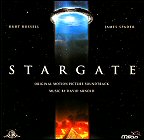 As a part of the movie, I’m very happy with David Arnold’s score for Stargate. It reflects the film’s blend of historical epic, contemporary military action, and futuristic SF adventure. It’s appropriately rousing during the battle scenes and it sets the mood for quieter moments. There is a fanfare here or a moment there that makes me think of John Williams, but that say more about how much I’ve internalized that work than anything else. The main themes are certainly distinct and memorable enough to stand the test of time, as their continued use in Stargate SG-1 would indicate.
As a part of the movie, I’m very happy with David Arnold’s score for Stargate. It reflects the film’s blend of historical epic, contemporary military action, and futuristic SF adventure. It’s appropriately rousing during the battle scenes and it sets the mood for quieter moments. There is a fanfare here or a moment there that makes me think of John Williams, but that say more about how much I’ve internalized that work than anything else. The main themes are certainly distinct and memorable enough to stand the test of time, as their continued use in Stargate SG-1 would indicate.
As an album in its own right, however, I’m not sure how well the soundtrack works. This isn’t a reorganized concert suite, but a collection of 30 music cues from throughout the movie. Many of them are very short, about a minute or so in length. They just don’t have the chance to build up much momentum of their own or stand out as distinct pieces, especially since Arnold continually goes back to variations of the main themes. The longer pieces that do exist, like “The Stargate Opens”, are rather good at telling the story musically; I  particularly like the loud build-up to the actual opening and then the quiet choral voices that reflect the shimmering open gate. The longest cue, “Battle At The Pyramid”, also flows very well and suggests the urgency and chaos of combat. But for the most part, this album tends to fade into background music for me, albeit very good background music.
particularly like the loud build-up to the actual opening and then the quiet choral voices that reflect the shimmering open gate. The longest cue, “Battle At The Pyramid”, also flows very well and suggests the urgency and chaos of combat. But for the most part, this album tends to fade into background music for me, albeit very good background music.
- Stargate Overture (3:01)
- Giza, 1928 (2:10)
- Unstable (2:07)
- The Coverstones (0:58)
- Orion (1:29)
- The Stargate Opens (3:58)
- You’re on the Team (1:55)
- Entering the Stargate (2:57)
- The Other Side (1:44)
- Mastadge Drag (0:56)
- The Mining Pit (1:34)
- King of the Slaves (1:15)
- Caravan to Nagada (2:16)
- Daniel and Shauri (1:53)
- Symbol Discovery (1:15)
- Sarcophagus Opens (0:55)
- Daniel’s Mastadge (0:49)
- Leaving Nagada (4:09)
- Ra – The Sun God (3:22)
- The Destruction of Nagada (2:08)
- Myth, Faith, Belief (2:18)
- Procession (1:43)
- Slave Rebellion (1:00)
- The Seventh Symbol (0:57)
- Quartz Shipment (1:27)
- Battle at the Pyramid (5:02)
- We Don’t Want to Die (1:57)
- The Surrender (1:44)
- Kasuf Returns (3:06)
- Going Home (3:09)
Released by: Milan/BMG
Release date: 1994
Total running time: 64:46
The Orchestra – No Rewind
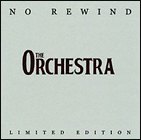 After nearly ten years of touring and recording, Electric Light Orchestra Part II – which included original ELO veterans Bev Bevan, Kelly Groucutt, Louis Clark and Mik Kaminski – met its match. It wasn’t touring exhaustion – unlike the usually reclusive Jeff Lynne, these guys love playing live. In this case, it was Lynne himself, who was in the process of reclaiming the ELO name for an upcoming greatest hits box set and an all-new album of original Lynne material; Lynne wanted any other use of the ELO name dropped. Drummer Bev Bevan, who had been with ELO ever since the band evolved from The Move in 1971, decided not only to give up the ELO Part II moniker, but to retire from performing as well.
After nearly ten years of touring and recording, Electric Light Orchestra Part II – which included original ELO veterans Bev Bevan, Kelly Groucutt, Louis Clark and Mik Kaminski – met its match. It wasn’t touring exhaustion – unlike the usually reclusive Jeff Lynne, these guys love playing live. In this case, it was Lynne himself, who was in the process of reclaiming the ELO name for an upcoming greatest hits box set and an all-new album of original Lynne material; Lynne wanted any other use of the ELO name dropped. Drummer Bev Bevan, who had been with ELO ever since the band evolved from The Move in 1971, decided not only to give up the ELO Part II moniker, but to retire from performing as well.
This left ELO Part II – now consisting of Groucutt, Clark, Kaminski, Eric Troyer and newly recruited guitarist Parthenon Huxley – with no drummer and no name. Huxley called on a friend of his, a fellow L.A. session player named Gordon Townsend, to audition for the open drum seat, and the rest of the band approved. Rechristened The Orchestra, the band continued touring, also booking studio time out of their own pockets on several tour stops to lay down tracks for a new album. The result, which the band proudly proclaims was created without a single cent of money from any labels or outside benefactors, is No Rewind, which marks an incredible reinvention of the group’s sound.
The band’s new blood – Huxley and Townsend – asserts itself right off the bat with “Jewel And Johnny”. Kicking off with a beat not a million miles away from the fun, jaunty gait of “Mr. Blue Sky” itself, Jewel and Johnny shows that the new recruits have, in fact, brought The Orchestra that much closer to the sound of old-school ELO. (It’s worth noting at this juncture that Huxley is from the same pool of reared-on-the-70s L.A. power pop talent that has also given us Jason Falkner and Jon Brion.) There were tracks on both of ELO Part II’s studio albums that faintly irritated me because they made it sound like the group was trying to bring a hard rock sound to the table; not so with No Rewind. The songs here are finely crafted pop-rock with a Beatlesque sensibility, which is, ironically, what Jeff Lynne was always trying to do with the original ELO. And the songs featuring Huxley on lead vocals are a real treat, because it sure doesn’t hurt that Huxley’s versatile baritone isn’t a million miles away from the voice of the aforementioned Mr. Lynne. Whether consciously or not, there seems to have been a reassessment of what made the original ELO what it was; the songwriting is sharper this time around, both musically and lyrically, with fantastic results.
Highlights include “Jewel And Johnny”, the mesmerizing and majestic “Let Me Dream” (co-written by ELO Part II veteran Eric Troyer and original ELO violin virtuoso Mik Kaminski), “Can’t Wait To See You” (another tune written and sung by Huxley, which is as close as one can imagine to a lost Jeff Lynne song), and the Troyer-written tracks “No Rewind” and “Say Goodbye”. The orchestral components of each song are several orders of magnitude beyond most of the output of ELO Part II – arranger Louis Clark is all over this album, imbuing the new songs with the densely layered string sound he gave to the classic ELO albums A New World Record and Out Of The Blue, but also wisely backing off and giving Mik Kaminski numerous opportunities to wow us with a single violin.
Curiously absent, however, are many frontman opportunities for classic ELO bassist/backup singer Kelly Groucutt; when he joined ELO Part II full-time in 1991, his distinctive background vocals brought the whole exercise much closer to being “real ELO.” He was all over the next studio album as both lead and background vocalist, as much as any one member of the band could be with the rotating-vocalist scheme, but he’s in the lead on only two out of ten songs here.
One of those two songs, incidentally, is a reworking of “Twist And Shout” which is almost funny in how it deceptively repaints the song as a downbeat dirge before allowing the original tune to emerge. Once we’re in familiar territory, however, it’s pretty much a pastiche of the Beatles’ cover of “Twist And Shout”, which is my one disappointment with No Rewind – all of the other songs are not only originals, but damned good originals. Ironically, the best of those originals sound more worthy of the ELO name than anything the band’s done before – so naturally, they’re no longer permitted to use the name.
No Rewind, whether in its limited (and now out-of-print) edition issued through the band’s official web site or in a real live label release from, of all places, Argentina, is worth a listen. When I first heard it, I was thinking  “Dear Jeff Lynne, get back together with your old bandmates.” But having listened to No Rewind more and more, and taking into consideration that it’s taking a long time for either Lynne or his erstwhile bandmates to release new material, I retract that. There are now two entities turning out an increasingly uncommon kind of music that I love. And that’s not a bad deal.
“Dear Jeff Lynne, get back together with your old bandmates.” But having listened to No Rewind more and more, and taking into consideration that it’s taking a long time for either Lynne or his erstwhile bandmates to release new material, I retract that. There are now two entities turning out an increasingly uncommon kind of music that I love. And that’s not a bad deal.
- Jewel & Johnny (3:56)
- Say Goodbye (4:25)
- No Rewind (4:07)
- Over London Skies (4:32)
- Twist And Shout (6:34)
- Can’t Wait To See You (3:28)
- If Only (4:38)
- I Could Write A Book (3:12)
- Let Me Dream (4:01)
- Before We Go (5:03)
Released by: ART Music (Argentinian release)
Release date: 2005
Total running time: 44:01

Minna Daisuki Katamari Damacy
When it hit the U.S. in 2004, Namco’s offbeat Playstation 2 sleeper hit Katamari Damacy had barely undergone the rigorous “localization” that most games from Japan are put through before hitting the English-speaking market. Numerous objects in the game were covered with Japanese lettering (nothing essential to the game play, mind you), and the game’s distinctive soundtrack was sung in Japanese as often as it was sung in English. And somehow it worked. So the question is: how do you top that?
The sequel game, Minna Daisuki Katamari Damacy, deftly sidesteps a lot of sequel expectations by being a self-referential tribute to the original game – and to some extent that includes the music as well. Several of the new tracks are tributes as well, putting a new twist on the signature tune of Katamari Damacy, ranging from a hilarious a capella rendition to a medley of all of the original Katamari songs as “sung” by sampled animal sounds – dogs, cats, ducks, elephants, etc. It’s a nice acknowledgement of the original, and at the same time, it’s having some fun and not overdoing it. Other songs like “Katamari On The Swing” split the difference, dropping references to the Katamari theme in during the chorus of an otherwise original number.
That isn’t to say that there aren’t some cracking good original songs though. In particular, I have to single out “Everlasting Love”, a punchy, upbeat number by Alisa (of Sailor Moon fame) with occasional bits of English peppered in throughout its Japanese lyrics, and featuring some fantastic guitar and vocal work. English or not, video game music or not, “Everlasting Love” is, hands-down, one of the catchiest songs I’ve heard this year, and it’s hard not to have a smile on one’s face while listening to it, and perhaps even harder to resist the urge to go back and listen again. “Disco Prince” throws a solid dance beat into the works, and other tunes repeat Katamari‘s effective use of styles that just don’t get a lot of airtime these days.
 As good as the music is, now that I’ve heard it, I can’t help but wonder how much fun the game is. The good news is that, while the soundtrack isn’t likely to see domestic release in North America, the game itself is slated for a fall release. Even if you don’t feel like having the CD shipped from Japan (even though, if you liked the original Katamari soundtrack, it’s worth it), you’ll soon have a shot at hearing the music in the game itself.
As good as the music is, now that I’ve heard it, I can’t help but wonder how much fun the game is. The good news is that, while the soundtrack isn’t likely to see domestic release in North America, the game itself is slated for a fall release. Even if you don’t feel like having the CD shipped from Japan (even though, if you liked the original Katamari soundtrack, it’s worth it), you’ll soon have a shot at hearing the music in the game itself.
- Introduction (0:24)
- Dokaka – Katamari On The Rocks (6:37)
- Asuka Sakai & Yu Miyake – Overture II (1:16)
- Shigeru Matsuzaki – Katamari On The Swing (4:40)
- Illreme- Kuru Kuru Rock (5:10)
- Alisa – Everlasting Love (4:45)
- Kirinji – Courageous Soul (5:32)
- Beautiful Star (3:08)
- You – Angel’s Rain (7:11)
- Katamari Robo – Houston (4:16)
- Kahimi Karie – Blue Orb (5:00)
- Yuusama – Katamari Holiday (5:37)
- Nomiya Maki – Baby Universe (5:06)
- Kenji Ninuma – Disco*Prince (7:01)
- Scorching Savanna (5:32)
(featuring John the Dog, Bigmouth the
Duck, Yuuhi the Cow, Pe the Goat, Booby the Pig, Sexy the Cat and Nyuu the
Cow)- Katsuro Tajima – The Royal Academy of Katamari (3:36)
- Kitomu Miyaza – King of King’s Song (4:41)
- Hidden Track (0:15)
Released by: Columbia Records Japan
Release date: 2005
Total running time: 79:47
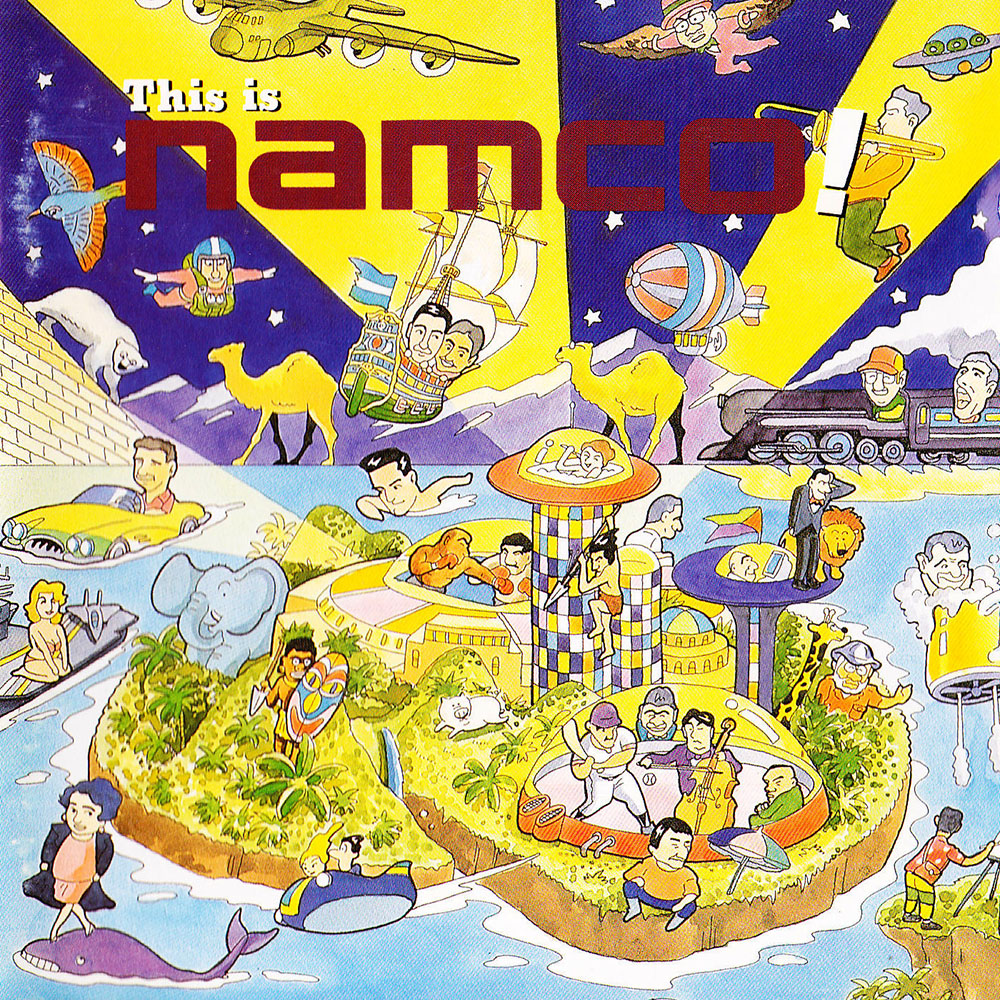
This Is Namco!
Celebrating the close of its most prolific decade in the video game business, and the company’s own 35th anniversary, Namco turned an ensemble of musicians loose on musical themes from the company’s legendary lineup of arcade games. Whether or not every resulting reinterpretation of those themes is successful is really in the ear of the beholder, but at the very least they’re all interesting new takes on the simplest of old favorites.
That simplicity is really the fascinating wild card of the This Is Namco! album. Some of these tunes hail from such an early period of video game sound that they barely even qualify as polyphonic. In some cases, with just one line of melody and perhaps one line of counterpoint to work from, the artists were free to layer their own improvisations onto the music freely, from rhythm to harmony. “Pac-Man A Go-Go” takes the simple intermission music from that game and turns it into a bouncy, brassy horn-and-sax jam. “One O’Clock Galaga ’88“, on the other hand, takes thematic material from that game and reinterprets it in a Benny Goodman-inspired style.
The boldest experiment on This Is Namco! is “Solo Suite Xevious No. 1″, which rearranges music from that seminal game into a piece for solo violin. Considering that the original music consists of intricate, fast-moving, almost hypnotic passages, that it actually works is almost surprising. The other pieces on the album, all arranged by Kenichiro Isoda and Kenichi Mitsuda, vary in how much they lean  on the original game music. “One O’ Clock Galaga ’88” is actually a good example of not relying on the original music very heavily at all, merely using it as a springboard.
on the original game music. “One O’ Clock Galaga ’88” is actually a good example of not relying on the original music very heavily at all, merely using it as a springboard.
This Is Namco! is a nice exercise in using the most basic of material for inspiration and coming up with something that, while the resemblance is still there, is on a whole different level.
- Pac-Man A Go-Go (5:07)
- One O’Clock Galaga ’88 (3:36)
- Mappy’s Lullaby (3:53)
- Dragon Spirit (6:28)
- Solo Suite Xevious – No. 1 (2:41)
- Tarosuke In Beijing Hotel (6:30)
- Main Theme From Rolling Thunder (7:29)
- Thunder Ceptor (4:23)
- The Return Of Ishtar (3:24)
- Ending Theme From Assault (5:22)
Released by: Apollon / Compusic
Release date: 1990
Total running time: 48:53
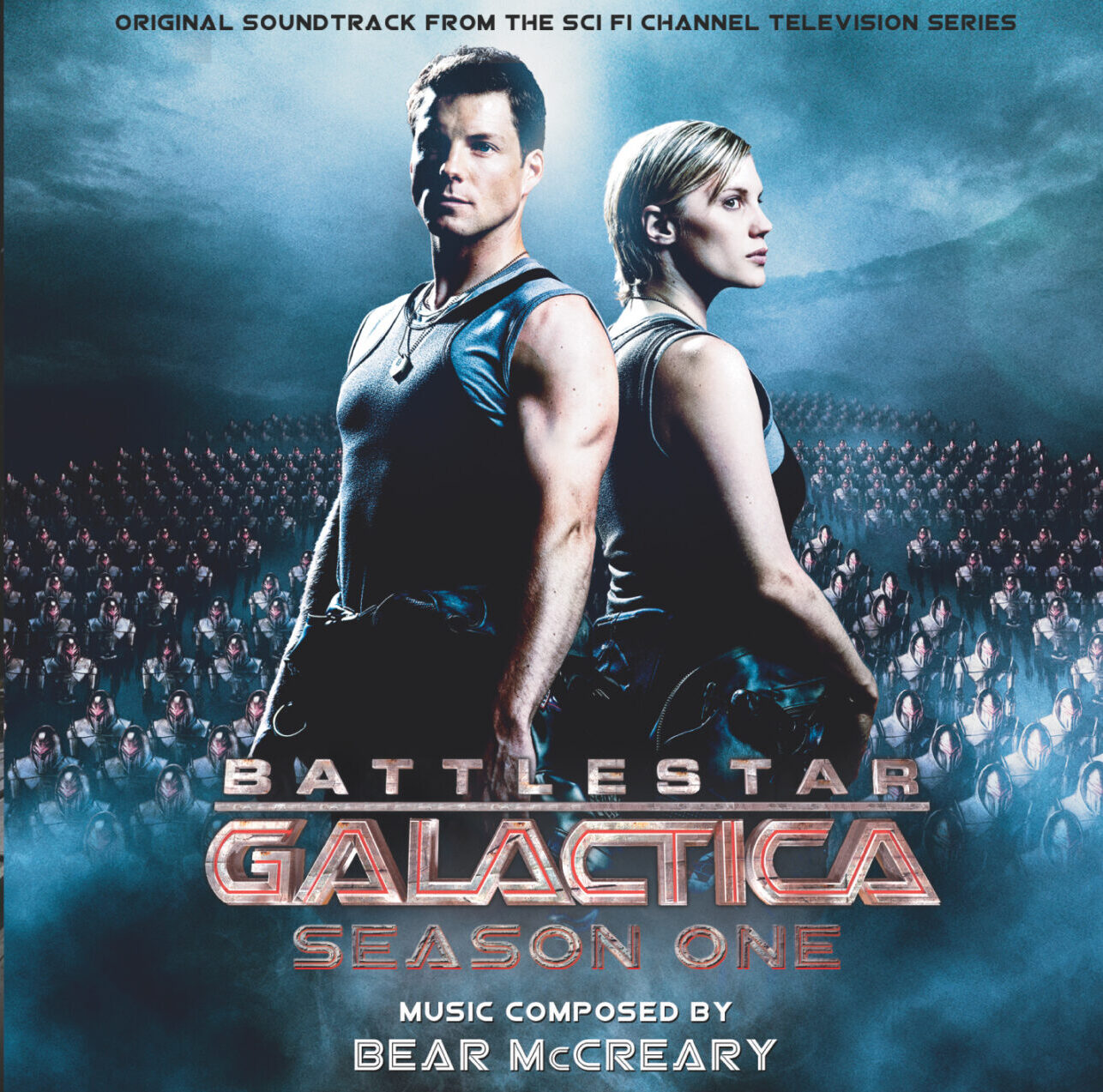
Battlestar Galactica: Season 1 – music by Bear McCreary
Rocketed through the usual licensing hurdles in what may be record time for a TV soundtrack album (usually the process takes at least a year after the show’s premiere, but in this case it was a mere few months), the first soundtrack from the weekly hour-long episodes of the new Battlestar Galactica is as near-exhaustingly visceral to listen to as the show is to watch. Nimbly leaping from ethnic polyrhythms to warlike martial drums as the situation demands, and sometimes layering one on top of the other, the action cues from this selection are some of the best I’ve heard, period – “Starbuck Takes On All Eight” is unrelenting enough to make one break a sweat while listening at a dead standstill. “The Olympic Carrier” delivers a cleverly literal treatment of the motif of the episode 33, dropping back to a ticking time-bomb of a strict one-beat-per-second meter as the action approaches its climax. And if Cylon sex scenes are your thing, grab “Two Boomers” and make yourself a sandwich (well, hey, it is an action scene of sorts…). It’s not a stretch to say that virtually all of the key action cues from the first season are represented here – if that’s what you’re looking for here, you’re not going to walk away disappointed.
It’s not all in the action cues, though. Tracks such as “Forgiven” and “Two Funerals” lend the show’s moments of human drama a lot of their weight, while “Helo In The Warehouse” is positiviely eerie. The miniseries isn’t forgotten either, with clockwork-like tuned percussion serving as a signature for the Cylons (and specifically Number Six) in tracks such as “Baltar Speaks With Adama”. Many of the pieces, while they still touch on the miniseries’ Mediterranean sound, also demonstrate a shift toward a somewhat wistful Gaelic sound. And after having grown accustomed to the show’s avoidance of the leitmotif-heavy Wagner-by-way-of-Korngold-by-way-of-Williams scoring that’s commonly associated with filmed science fiction, hearing a full-on orchestra is almost a shock to the system in “Passacaglia” and “The Shape Of Things To Come”, the latter dedicated to composer Bear McCreary’s late mentor, Hollywood great Elmer Bernstein. There’s another unexpected instrumental surprise with “Flesh And Bone”‘s guitar work. A fun handful of source cues appears as well, some with lyrics, and you’ll probably be interested to read the translation of those lyrics in the liner notes.
And while the new Battlestar Galactica has escaped the “Star Wars Lite” style that both distinguished and occasionally hampered the original 1970s incarnation of Galactica, it’s interesting to hear that themes do emerge. Characters and even concepts have their own musical and, occasionally, rhythmic signatures. But it’s more subtle than what you may be accustomed to. After years and years of this genre, and really, a lot of other genres, being represented by droning orchestral and synth chords, it’s a treat to hear barrages of military percussion, talking drums, wailing vocals, and what honestly sounds, in a few  cases, like large pieces of metal slamming together (as cathartic as it is to listen to some of these pieces, it’s got to be at least that much fun to be performing them!). The new Galactica demands a visceral, pulse-pounding sound, and Bear McCreary and his small army of musicians deliver it in spades. If the first episode of season two is anything to judge by, I’ll go ahead and leave an open space for the season two soundtrack. No rush, though – I’ll be listening to season one for quite a while yet.
cases, like large pieces of metal slamming together (as cathartic as it is to listen to some of these pieces, it’s got to be at least that much fun to be performing them!). The new Galactica demands a visceral, pulse-pounding sound, and Bear McCreary and his small army of musicians deliver it in spades. If the first episode of season two is anything to judge by, I’ll go ahead and leave an open space for the season two soundtrack. No rush, though – I’ll be listening to season one for quite a while yet.
- Prologue (0:28)
- Main Title – U.S. Version (1:02)
- Helo Chase (1:29)
- The Olympic Carrier (5:39)
- Helo Rescued (0:59)
- A Good Lighter (1:52)
- The Thousandth Landing (3:04)
- Two Funerals (3:22)
- Starbuck Takes On All Eight (3:44)
- Forgiven (1:28)
- The Card Game (3:01)
- Starbuck On The Red Moon (1:58)
- Helo In The Warehouse (1:59)
- Baltar Speaks With Adama (1:52)
- Two Boomers (1:46)
- Battlestar Operatica (2:33)
- The Dinner Party (3:12)
- Battlestar Muzaktica (1:41)
- Baltar Panics (1:44)
- Boomer Flees (1:14)
- Flesh And Bone (4:04)
- Battle On The Asteroid (6:50)
- Wander My Friends (2:55)
- Passacaglia (5:13)
- Kobol’s Last Gleaming (2:47)
- Destiny (4:42)
- The Shape Of Things To Come (2:53)
- Bloodshed (1:46)
- Re Cap (0:34)
- Main Title – U.K. Version* (1:06)
Released by: La-La Land Records
Release date: 2005
Total running time: 78:33
* The U.K. version also appears to be the main theme for season two on the Sci-Fi Channel in the U.S., though without the rapid-fire clip montage set to a furious battery of drums; a similar (but far more drastic) editing fate also seems to have befallen Sci-Fi’s other major original series, with Stargate SG-1 and Stargate Atlantis having had their opening title sequences trimmed down to 10-15 seconds each.
Ben Folds – Songs For Silverman
 With a portfolio that includes such ironic Generation X anthems as “Song For The Dumped”, “Rockin’ The Suburbs” and collaborations with William Shatner and Weird Al Yankovic, it may be easy to pigeonhole Ben Folds as a wacky alt-rock guy, and for a while, even he might have been content with that label. But his latest album, Songs For Silverman, is a bit less loaded down with that almost prerequisite irony – it’s a finely crafted, mature collection that, while not without moments of humor, acknowledges that the artist (and, perhaps, his fan base) is growing up.
With a portfolio that includes such ironic Generation X anthems as “Song For The Dumped”, “Rockin’ The Suburbs” and collaborations with William Shatner and Weird Al Yankovic, it may be easy to pigeonhole Ben Folds as a wacky alt-rock guy, and for a while, even he might have been content with that label. But his latest album, Songs For Silverman, is a bit less loaded down with that almost prerequisite irony – it’s a finely crafted, mature collection that, while not without moments of humor, acknowledges that the artist (and, perhaps, his fan base) is growing up.
There are several standouts among the introspective set of songs here; “Bastard” laments how we all get more set in our ways and inflexible as we get older; this song really sets a lot of the album’s tone – it’s steeped in the pure pop songwriting and performance sensibilities of the 1970s, the age of Carole King and James Taylor and Billy Joel and pre-African-percussion-obsessed Paul Simon. I realize that the Billy Joel comparison is nothing new where Ben Folds is concerned, but the comparison has evolved beyond the superficial one-man-and-his-piano similarities here.
“You To Thank”, “Trusted” and “Landed” are further examples of Folds’ rooted-in-the-70s style for this album, being a particular combination of lush and bluesy at the same time, with “Landed” being possibly the best thing on the album and a wise (yet unconventional) choice for a lead single. “Jesusland” is a slightly ironic travelogue through the American midwest with some nice string work and great vocal harmonies.
For those fans who, like myself, eagerly snatched up Folds’ three between-albums solo EPs in 2003 and 2004, Songs For Silverman contains only one of those songs: a surprisingly earnest, country-fried rendition of “Give Judy My Notice”. I was taken aback to hear this particular song re-recorded with pedal steel guitar, but at the same time, Folds’ own inclination toward a southern twang makes it authentic, and I quickly grew to like this version better.
Another highlight of the whole album is “Time”, a song that really made me appreciate what a fantastic voice Folds has. I’ve always liked his voice, but something about Songs For Silverman‘s stripped-down, spare style brings the vocals to the forefront. (Speaking of vocals, “Time” features some great backing vocals credited to the aforementioned Mr. Al Yankovic, someone else whose voice tends to be underrated.)
In short, a fantastic album, one of the best things I’ve heard this year. It may not have the “punch line” of Rockin’ The Suburbs, but Songs For Silverman doesn’t need a punch line. There are still plenty of instances of  classic Ben Folds humor on his recent series of EPs (and again, I can’t recommend strongly enough that fans pick those CDs up, because Folds as made a whole album’s worth of material in the interval between Suburbs and Silverman, and none of it has been “reject” material). Songs For Silverman is a fine example of some damned good songwriting, something for which Ben Folds is long overdue some credit.
classic Ben Folds humor on his recent series of EPs (and again, I can’t recommend strongly enough that fans pick those CDs up, because Folds as made a whole album’s worth of material in the interval between Suburbs and Silverman, and none of it has been “reject” material). Songs For Silverman is a fine example of some damned good songwriting, something for which Ben Folds is long overdue some credit.
- Bastard (5:23)
- You To Thank (3:36)
- Jesusland (4:30)
- Landed (4:28)
- Gracie (2:40)
- Trusted (4:08)
- Give Judy My Notice (3:37)
- Late (3:58)
- Sentimental Guy (3:03)
- Time (4:30)
- Prison Food (4:15)
Released by: Epic / Sony
Release date: 2005
Total running time: 44:12
Star Wars Episode III: Revenge Of The Sith
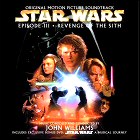 The final installment of the Star Wars saga not only brings closure to the story of the Skywalker family, it also closes off a legacy of around ten solid hours of some of the most memorable music of the past 50 years – and note that I didn’t narrow that down to “film music” either. John Williams returns to cap off the musical story with his intense, dark score for Star Wars Episode III: Revenge Of The Sith, and it’s an appropriate musical summation of both the underrated prequel trilogy and of the saga as a whole.
The final installment of the Star Wars saga not only brings closure to the story of the Skywalker family, it also closes off a legacy of around ten solid hours of some of the most memorable music of the past 50 years – and note that I didn’t narrow that down to “film music” either. John Williams returns to cap off the musical story with his intense, dark score for Star Wars Episode III: Revenge Of The Sith, and it’s an appropriate musical summation of both the underrated prequel trilogy and of the saga as a whole.
“Revenge Of The Sith” packs a surprising punch, coming out of the familiar main title music not with a gentle, sinister interlude, but with a tradition-shattering, in-your-face battle sequence that simply does not let up; at nearly eight continuous minutes, it’s breathtaking stuff. (Though it’s also savagely edited – if you’ve seen the movie, you know that we still got the traditional sinister interlude at the beginning.) Stylistically, there’s something about this track that screams “prequel trilogy” at me – it’s from the same sonic continuum as Episode I‘s rousing podracing music (reused for battle scenes in Episode II and, indeed, in this movie) and the final battle from the same movie.
Track 2, “Anakin’s Dream”, opens up with a surprisingly intimate reading of the Anakin/Padmè love theme from Episode II before treading into darker, murkier waters, twisting that theme subtly until it’s disturbingly dissonant.
“Battle Of The Heroes” is to this score what “Duel Of The Fates” was to Episode I, and in fact I seem to remember reading in 1999 that Lucas had earmarked “Fates” for a reprise during Obi-Wan’s final battle with Anakin. And while “Fates” does make a reappearance in the movie – over Yoda’s epic battle with Darth Sidious – I’m glad that Lucas changed his mind on this front and decided that the Anakin/Obi-Wan battle needed something different. “Heroes” and “Fates” are nice companion pieces, but “Heroes” is brimming with an appropriately tragic inevitability, played out on an operatic scale. “Duel Of The Fates” may have been a little catchier with its low, urgent ostinato – “Heroes”, by contrast, has an undulating, long-lined melody that changes subtly over the course of the piece – but a straight reprise of “Fates” by itself wouldn’t have had the same emotional dynamic that this movie needed. And now we can happily sit and listen to the two of them back-to-back.
“Anakin’s Betrayal” has something of the same operatic sensibility as “Battle Of The Heroes”, and something of its tragedy as well, but it’s a much slower build, almost a stately funeral procession. And we’ll get back to that idea a bit later.
“General Grievous” drags us back into fast-paced action music whether we’re ready for it or not, with busy, dissonant, stabbing brass stings, and low, dark iterations of the Force theme shared by both trilogies; musically, it has a lot in common with the chaotic action scenes toward the beginning of Episode II.
“Palpatine’s Teachings” startled me with how Goldsmithian it was; it’s all low meditations on the established themes for the Emperor and Vader, with solo French horns standing out in stark contrast, and menacing strings that almost make it sound like Jerry Goldsmith returned from the other side just to score a cue for the last Star Wars movie. The cue ends with a triumphant restatement of the Coruscant music from Episode I, one of my favorite pieces of music to have emerged from the prequel trilogy, though it’s used here to represent Senator Organa’s ship: it’s become a theme for the last shards of the Republic’s democracy, not merely a particular place.
“Grievous And The Droids” gets us back to some action music which is probably as close as this score gets to the action cues of the original trilogy. “Padmè’s Ruminations” is another more atmospheric track.
“Anakin Vs. Obi-Wan” starts out in much the same vein as “Battle Of The Heroes”, but it is this cue where we get the first full-blooded statement of Vader’s theme (a.k.a. “The Imperial March”, heard here in a form very much like the scenes from Return Of The Jedi in which Vader watches Luke’s torture at the hands of the Emperor. Eventually the music returns to “Battle Of The Heroes”, but not after a full musical notification that we’re reaching the point of full circle (and, plotwise, the point of no return) with the original trilogy.
“Anakin’s Dark Deeds” is apocalyptic, operatic, and quite chilling. I’m not sure what else I can say here or what else really needs to be said. “Enter Lord Vader” is dark, but far more bombastic. There’s a quiet interlude for a mournful rendition of the Anakin/Padmè love theme again, but after that, for all intents and purposes, the music accomapnies the footsteps of evil, concluding in another full-blast iteration of Vader’s theme. The next track (I’m deliberately not mentioning the title here, though it is in the track list toward the bottom of this review) covers one of the movie’s most disturbing scenes with the right doses of horror and sympathy.
“Grievous Speaks To Lord Sidious” opens up with another blast of operatic fury, but then settles into something quieter but still sinister. “The Birth Of The Twins” and “Padmè’s Destiny” brings back the music from Qui-Gon’s funeral in Episode I, but on a far more grand scale – think along the lines of a gigantic Catholic Mass, and you’ll get the idea.
“A New Hope and End Credits” puts us firmly on the road toward the original three films, with gentle, childlike renditions of Luke and Leia’s theme, followed by a lonely restatement of the “Binary Suns” cue from Star Wars as Obi-Wan begins his exile. From there we segue into the traditional end credits which, for the first few minutes, are virtually the end credits from the original Star Wars – the full recaps of Luke and Leia’s themes act as a bit of musical foreshadowing, eventually leading us to “Battle Of The Heroes”. After that, however, Williams starts reaching much further into the original trilogy, bringing us up to the end of the first movie with several repetitions of the Rebel medal ceremony. This last cue is over 13 minutes long – that’s a lot of credits – and while I find the choice of music fascinating and appropriate, it’s really my one disappointment with the CD as a listening experience. With that kind of running time, it just seems as though Williams squandered his opportunity for one final summation of the entire saga, from Phantom Menace through Return Of The Jedi. There was certainly enough time to something more than eight minutes of the medal march. Something marrying Anakin’s themes from the first two prequels with the themes of his children might have been more appropriate. I wouldn’t be griping, except that I’ve always loved how John Williams synthesizes all of the major themes of a given film in his end credit suites – it’s always been where he shows off some of his most ingenious work. With this kind of running time, this is a grand finale that just doesn’t seem grand enough. To be fair, however, the decision to use – and re-use and re-re-use – that theme may have been made by someone other than the composer himself.
With the movie’s music itself, and not just what’s heard here on this CD, there is the same slight gripe that I had after seeing Attack Of The Clones – there’s a lot of material lifted from earlier movies, though I strongly suspect that some of it was spliced in during editing in order to keep the music coming. The score for Revenge Of The Sith is almost continuous – there are very few scenes that don’t have something in them. I suspect we won’t see an expanded release of this score or the score from Clones, simply because so much of it is edited in from the Phantom Menace score. I was surprised – though I shouldn’t have been – to hear the rousing action music from Anakin’s podrace reprised yet again during the escape from Grievous’ ship. I’m not sure if the decision to do stuff like that was made by the composer or by the director, but that kind of “tracking from library,” from my perspective, denied us the chance to hear Williams strut his stuff one last time. Even though I was underwhelmed with portions of Clones, I still think that giving John Williams a chance to create new soundscapes can only be a good thing. To do otherwise turned portions of each subsequent movie into, effectively, a greatest hits album. I know that podrace music is hard to beat for pure, pulse-pounding action, but does that mean we’re not going to give the man a chance to try?
So there it is, the final Star Wars movie score – at least where Star Wars movies made by their creator are concerned. I realize the word “tragic” probably appears 45 times in the above review, followed immediately by you, the reader, saying “well, duh!”, but that just means that the music hit its marks, doing what John Williams’ music does best and serving as a Greek chorus all its own. There are TV projects waiting the wings, and whether or not Williams is involved with those, or if others add their own music to the legacy or merely re-edit or re-interpret Williams’ themes, there’s no way to deny that he’s made an indelible mark on film music, and on the musical consciousness of at least two generations. It’s hard to really calculate the impact he’s had, but it’s easy to say that it’s been a great ride.

- Star Wars and The Revenge Of The Sith (7:31)
- Anakin’s Dream (4:46)
- Battle Of The Heroes (3:42)
- Anakin’s Betrayal (4:04)
- General Grievous (4:07)
- Palpatine’s Teachings (5:25)
- Grievous And The Droids (3:28)
- Padmè’s Ruminations (3:17)
- Anakin Vs. Obi-Wan (3:57)
- Anakin’s Dark Deeds (4:05)
- Enter Lord Vader (4:14)
- The Immolation Scene (2:42)
- Grievous Speaks To Lord Sidious (2:49)
- The Birth Of The Twins and Padmè’s Destiny (3:37)
- A New Hope and End Credits (13:06)
Released by: Sony Classical
Release date: 2005
Total running time: 70:51

Star Trek: Starfleet Academy
This is an item that took years to track down for my soundtrack collection, and the history of Starfleet Command – and its rarity – is a story unto itself. Bearing the slightly inaccurate legend “Award-winning music from the composer of numerous TV series and Star Trek movies, Ron Jones” (Jones never scored a Trek movie, and over half of the CD’s music was composed by someone else), this CD is the soundtrack from the hit computer game Star Trek: Starfleet Academy. But what’s with the rarity? Surely anything bearing the Star Trek name would be mass-marketed to a fault, wouldn’t it?
In 1998, indie label Sonic Images (started by Christopher Franke of Tangerine Dream and at the time best known for its ongoing series of Babylon 5 “episodic” CDs, each containing the entire score to just one show), won the license to give the Starfleet Academy soundtrack a general release. And around the same time, Sony was prepping its nicely remastered and gorgeously packaged re-release on CD of the Star Trek: The Motion Picture soundtrack, which had been out of print for several years.
But there was one other thing that happened in 1998 that nixed both of those releases: Paramount wanted to give priority to marketing the then-upcoming Star Trek: Insurrection. The studio told Sony and Sonic Images to hold their releases back; Sony later released The Motion Picture 2-CD set in 1999 (which worked better anyway, as that was the film’s 20th anniversary), but Sonic Images’ license was not renewed by Paramount. The label had a warehouse full of pressed CDs, and wanted to renew the license and release that inventory. But Paramount wouldn’t budge – and so Starfleet Academy‘s soundtrack, for most, never saw the light of day.
Rumors abounded about the cause of the cancellation, including the possibility that Rick Berman, who had input into Star Trek product licensing, nixed the release to retaliate against former Star Trek: The Next Generation composer Ron Jones’ less-than-flattering comments about his time on the series. Whatever the reason, the only copies of Starfleet Academy that made it into the public’s hands came in the form of premium offers, a limited edition run of the game which included the soundtrack CD, and advance copies of the CD sent out to video game and music journalists ahead of the Sonic Images release. With its cutscenes starring William Shatner and George Takei, and its lush musical score composed and conducted by someone who had actually been connected to the franchise, Starfleet Academy was something of a big deal at the time. Thus ends the tumultuous story of the soundtrack’s premature demise.
Where the music itself is concerned, the first ten tracks will be familiar to those who fondly recall Jones’ music from the first four seasons of Star Trek: The Next Generation. His signature sound is sweeping, nautical, and dramatic, paying homage equally to the Star Trek film scores of James Horner and the late, great Jerry Goldsmith and melding those sensibilities nicely. Some of the passages of Starfleet Academy’s musical score are very reminiscent of Jones’ fourth-season Next Generation episode The Nth Degree, and it’s all great stuff – the sort of adventurous bombast that became verboten on the TV series, and yet makes the soundtrack for this computer game sound like a legitimate entry in the movie series.
Jones protegè Brian Luzietti provides the remainder of the music for Starfleet Academy, and while it’s interesting to hear someone attempt to reach toward the same style, some of Luzietti’s tracks don’t quite have the “oomph” of Jones’ music. Then again, that’s probably also a side effect of hearing the music outside of its intended medium – these things would probably  go unnoticed buried under the layers of sound effects and pre-recorded dialogue that typically accompany a computer game from the 1990s. Luzietti is at his best when he’s doing his own thing and not trying to meet Jones halfway stylistically, and some of his tracks are quite listenable indeed – and legitimately Trekkish, with throwbacks to the Alexander Courage fanfare for the original series.
go unnoticed buried under the layers of sound effects and pre-recorded dialogue that typically accompany a computer game from the 1990s. Luzietti is at his best when he’s doing his own thing and not trying to meet Jones halfway stylistically, and some of his tracks are quite listenable indeed – and legitimately Trekkish, with throwbacks to the Alexander Courage fanfare for the original series.

- Starfleet Academy Theme (4:07)
- Surrounded (2:22)
- Evasive Maneuvers (2:22)
- Exploring The Unknown (1:57)
- On The Edge (2:49)
- Crew Introduction (1:50)
- Red Alert (2:49)
- On To Victory (2:22)
- Discovery (1:59)
- No Way Out (2:22)
- To Stop The Vanguard (3:41)
- Personal Problems (0:40)
- Romulan Suicide (1:04)
- Kirk’s Briefing (1:19)
- Venturi Suite (3:03)
- Sneaking Instincts (1:21)
- The Vanguard’s Plans (1:35)
- Log – Looking Grim (1:04)
- Log – Mission Accomplished (1:04)
- Log – Situation Normal (1:05)
- Thoughts Before The Briefing (1:38)
- Forester – Captain Of The Enterprise (4:00)
Released by: Interplay Productions (1998 Sonic Images release cancelled)
Release date: 1997
Total running time: 46:44
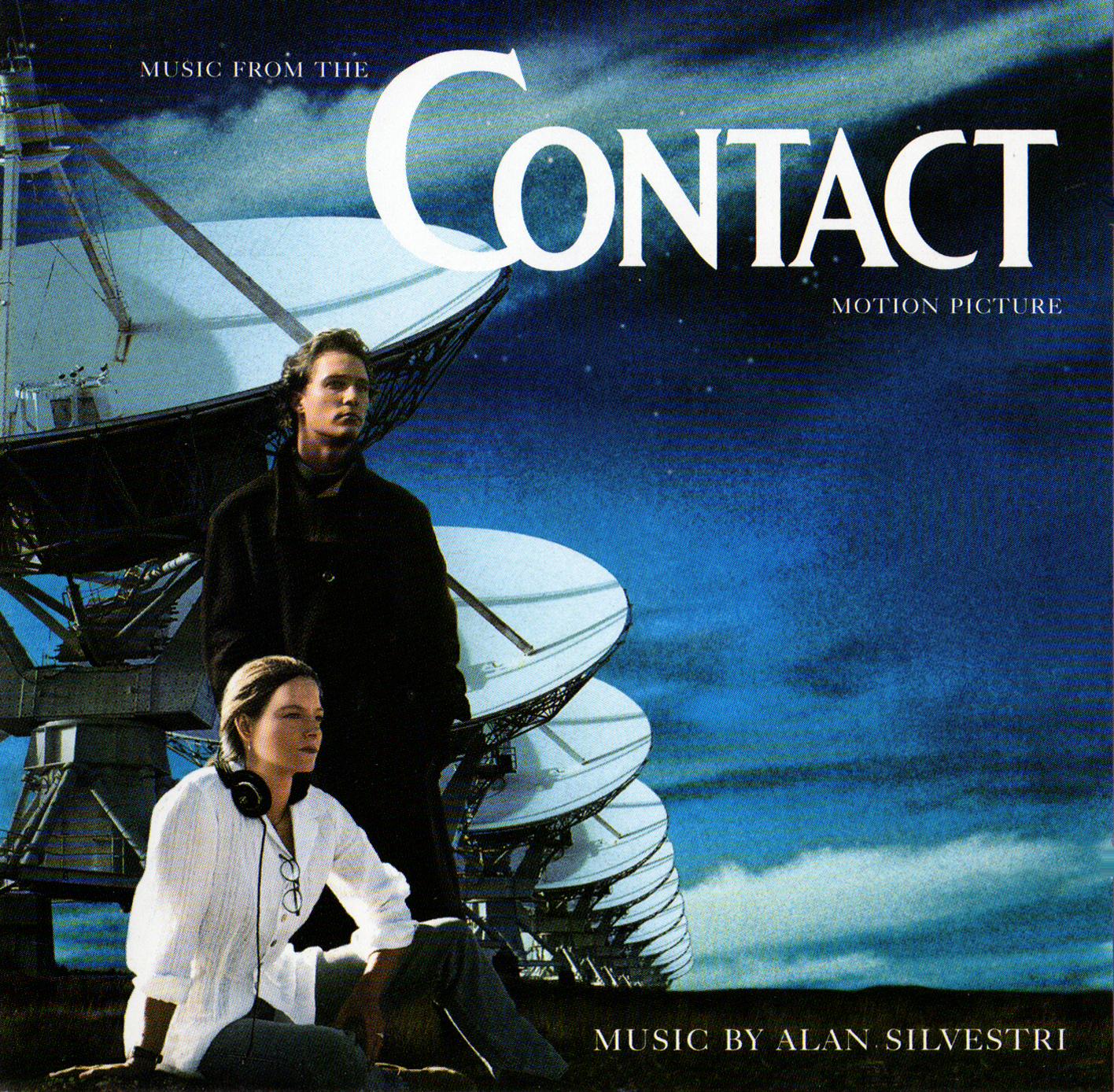
Contact – music by Alan Silvestri
One of the most atypically-scored science fiction films of the 1990s, Contact is also yet another chapter in the long-running collaboration between director Robert Zemeckis and composer Alan Silvestri (Who Framed Roger Rabbit?, Forrest Gump). While not as epic an ongoing partnership as, say, Spielberg and John Williams, the Zemeckis/Silvestri pairing has resulting in some fine marriages between imagery and music, and Contact may well be the best of those collaborations.
Before I get much further with my rantings about how atypical a science fiction movie score this is, it’s also worth pointing out that Contact is hardly a typical science fiction movie. It does have imagination-sparking ideas and some fine action and special effects set pieces, but it’s also a character study at its heart. So given those moments of intense action, and the even greater scenes of awe and wonder, Contact gets a surprisingly subdued musical treatment; a good chunk of the almost eight-minute-long end credits is solo piano, as are some of the other cues selected for the soundtrack album.
I did like Silvestri’s equally low-key moments of menace and revelation, however: “The Primer”, which plays during one of the movie’s most pivotal moments, is one of those cues that just opens up like a flower at a certain point, introducing a slithering, arpeggiating synth motif that shows up a few other times in conjunction with the aliens’ message and technology. That sound weaves its way in and out of what is otherwise a much more acoustic, orchestral score, and while it makes for a noticeable contrast, it’s subtle enough to never quite become jarring.
When the opportunity arrives to do big action scenes, Silvestri doesn’t hold back – “Ellie’s Bogey”, “Good To Go” and “Test Run Bomber” are great examples of those moments, even if they’re not necessarily the heart of the movie or its music.
Overall, it’s probably not quite what you’d expect, but the same could be said of the movie itself. (And for all  those who have written me over the years to tell me that Contact the movie bears almost no resemblence to “Contact” the novel, I get the message, thanks.) If not one of the best – that’s really subjective – it’s certainly one of the most interesting SF film scores of the late 1990s, and I recommend it at least for that.
those who have written me over the years to tell me that Contact the movie bears almost no resemblence to “Contact” the novel, I get the message, thanks.) If not one of the best – that’s really subjective – it’s certainly one of the most interesting SF film scores of the late 1990s, and I recommend it at least for that.
- An Awful Waste Of Space (1:43)
- Ellie’s Bogey (3:25)
- The Primer (6:21)
- Really Confused (1:18)
- Test Run Bomber (4:27)
- Heart Attack (1:31)
- Media Event (1:25)
- Button Me Up (1:19)
- Good To Go (5:11)
- No Words (1:42)
- Small Moves (5:35)
- I Believe Her (2:32)
- Contact – End Credits (7:59)
Released by: Warner Bros.
Release date: 1997
Total running time: 44:31
Battlestar Galactica – music by Richard Gibbs
 If ever there was a case of musically “playing against type,” the score for 2003’s Battlestar Galactica miniseries is it. The music of the original series had such a foothold in the collective memory of the viewers that it’d be hard to avoid comparisons. And yet, as fitting as Stu Phillips’ exercise in sounding like John Williams was for the original 1978 miniseries and series, Richard Gibbs’ and Bear McCreary’s score for the new version is equally fitting. It’s a visceral, almost mournful, score for a new take on the series that seems to be, more than any SF project of the past few years, informed by the 9/11 experience and its attendant emotions.
If ever there was a case of musically “playing against type,” the score for 2003’s Battlestar Galactica miniseries is it. The music of the original series had such a foothold in the collective memory of the viewers that it’d be hard to avoid comparisons. And yet, as fitting as Stu Phillips’ exercise in sounding like John Williams was for the original 1978 miniseries and series, Richard Gibbs’ and Bear McCreary’s score for the new version is equally fitting. It’s a visceral, almost mournful, score for a new take on the series that seems to be, more than any SF project of the past few years, informed by the 9/11 experience and its attendant emotions.
There’s not a lot of orchestral writing, but contrary to some reports, there is some. Rather than going for a full-on western orchestral approach, Gibbs and McCreary mix orchestra with ethnic percussion and vocalizations. In the CD liner notes, Gibbs talks about how several scenes of the movie had been temp-tracked by director Michael Rymer with music from Peter Gabriel’s soundtrack for The Last Temptation Of Christ, and that’s a fairly good analogy for what the new Galactica wound up with. Gibbs and McCreary reined things in just a little bit, with a more traditional western feel than the aforementioned film score, but the Gabriel influence is clearly there: battle scenes tend to be tracked with Japanese taiko drums and a thunderous mix of other percussion. The scenes associated with the plight of the Colonials tend to be treated with wistful Middle Eastern vocals, a little bit of orchestra, and occasionally a bit of tuned percussion – Gabriel would be proud.
And it would seem that the composers took as many hints from Christopher Franke as they did from Peter Gabriel; the cue “Seal The Bulkheads” is given an epic-but-elegiac sound, as Commander Adama makes the decision to seal off a critically damaged portion of the ship, sacrificing the lives of several crewmembers still trapped inside. There’s no thundering action here (though the fast-cutting editing of that sequence and the show as a whole would have lent itself to that), but more of a funeral dirge for those lost.
When Gibbs arrived to work on Galactica, a scene had already been temp-tracked with a Sanskrit mantra loaned to the director by Edward James Olmos; Gibbs found that it was so hard to top that he phonetically transcribed the mantra and included it as a vocal for the track “To Kiss Or Not To Kiss”, which is easily the soundtrack’s most sensual cue; “The Lottery Ticket” and “The Storm And The Dead” tie for a close second in that department. I also liked some of the cues that are heard early in the miniseries, which build a sense of anticipation without really being specific about the end result of that anticipation being good or bad. (That “anticipation” motif shows up again in the final scenes, and the effect is altogether different – in that context, it’s almost like a musical demand for a series order.) My one regret is that the expansive main title for the miniseries seems to have been replaced with a more mournful piece to cover the main titles of the weekly series – but again, it fits with the tone of the series, whereas’ the miniseries’ main titles occurred before the real jeopardy of the story kicked in.
I’m a little torn on recommending the Battlestar Galactica miniseries soundtrack as an all-in-one-sitting listening experience – if you have it playing in the background and you’re not listening for the intricacies of the music, it all blurs together a bit. But a close listen makes it clear why this approach was chosen for the new Galactica – and it’s no surprise that the early episodes of the hourly series sound as though they may have  been tracked with this same material (fittingly enough, as the original Galactica was tracked from a limited library of music composed for a small handful of specific episodes).
been tracked with this same material (fittingly enough, as the original Galactica was tracked from a limited library of music composed for a small handful of specific episodes).
Good stuff – let’s hope that the series is around long enough to get some more music, and maybe another CD or two, out of the composers.
- Are You Alive? / Battlestar Galactica Main Title (5:28)
- Goodbye, Baby (2:24)
- Starbuck Buck Buck (1:49)
- To Kiss Or Not To Kiss (2:42)
- Six Sex (1:48)
- Deep Sixed (1:59)
- The Day Comes (1:08)
- Counterattack (2:40)
- Cylons Fire (1:34)
- A Call To Arms (1:03)
- Apollo To The Rescue (1:56)
- Launch Vipers (4:26)
- Seal The Bulkheads (2:10)
- The Lottery Ticket (3:06)
- Eighty-Five Dead (1:23)
- Inbound (1:23)
- Apollo Is Gone / Starbuck Returns (2:19)
- The Storm And The Dead (2:40)
- Thousands Left Behind (2:09)
- Silica Pathways (3:32)
- Reunited (1:56)
- The Sense Of Six (3:01)
- Starbuck’s Recon (1:11)
- Battle (7:40)
- Good Night (2:38)
- By Your Command (1:56)
Released by: La-La Land Records
Release date: 2004
Total running time: 67:04
Finn Brothers – Won’t Give In
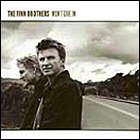 The first single from Tim & Neil Finn’s recent Everyone Is Here album, “Won’t Give In” is accompanied on this CD single by a couple of songs that, perhaps, lend a little bit of insight into why that album was essentially recorded twice.
The first single from Tim & Neil Finn’s recent Everyone Is Here album, “Won’t Give In” is accompanied on this CD single by a couple of songs that, perhaps, lend a little bit of insight into why that album was essentially recorded twice.
The lead single itself is, naturally, the same as what appears on the album, no surprises there. The real gem of this three-track CD is “Way Back Down”, a Neil-heavy number with some fun lyrics and interesting musical structure that just begs for a singalong. “Way Back Down” was produced by Mitchell Froom, the Crowded House producer who worked with the Finns to rerecord all but one of the tracks for Everyone Is Here almost from scratch. As catchy as it is, I’m surprised that this song didn’t make the cut for the album itself; I could actually nominate a song or two whose place it could’ve taken.
“Almost” means that some elements, especially the occasional orchestral backing arrangement, was salvaged from the original sessions produced by the legendary Tony Visconti. The second non-album B-side featured here, “Sunset Swim”, is a survivor of those original sessions, and it’s a laid-back, folky number with some interesting, singing-in-the-round elements to it. Interestingly, the one Visconti-produced track to survive on the album itself was the slickly-produced “Disembodied Voices”, which didn’t sound out of step with the Froom-produced tracks. “Sunset Swim”, on the other hand, is loose enough that it almost hearkens back to the  original Finn Brothers album – and whether the artists or their label made the decision, one gets the feeling that someone wanted to avoid that comparison.
original Finn Brothers album – and whether the artists or their label made the decision, one gets the feeling that someone wanted to avoid that comparison.
An interesting trio of songs, this one – it’s worth it just to hear “Way Back Down”.
- Won’t Give In (4:18)
- Way Back Down (4:12)
- Sunset Swim (3:50)
Released by: Parlophone / EMI
Release date: 2004
Total running time: 12:22
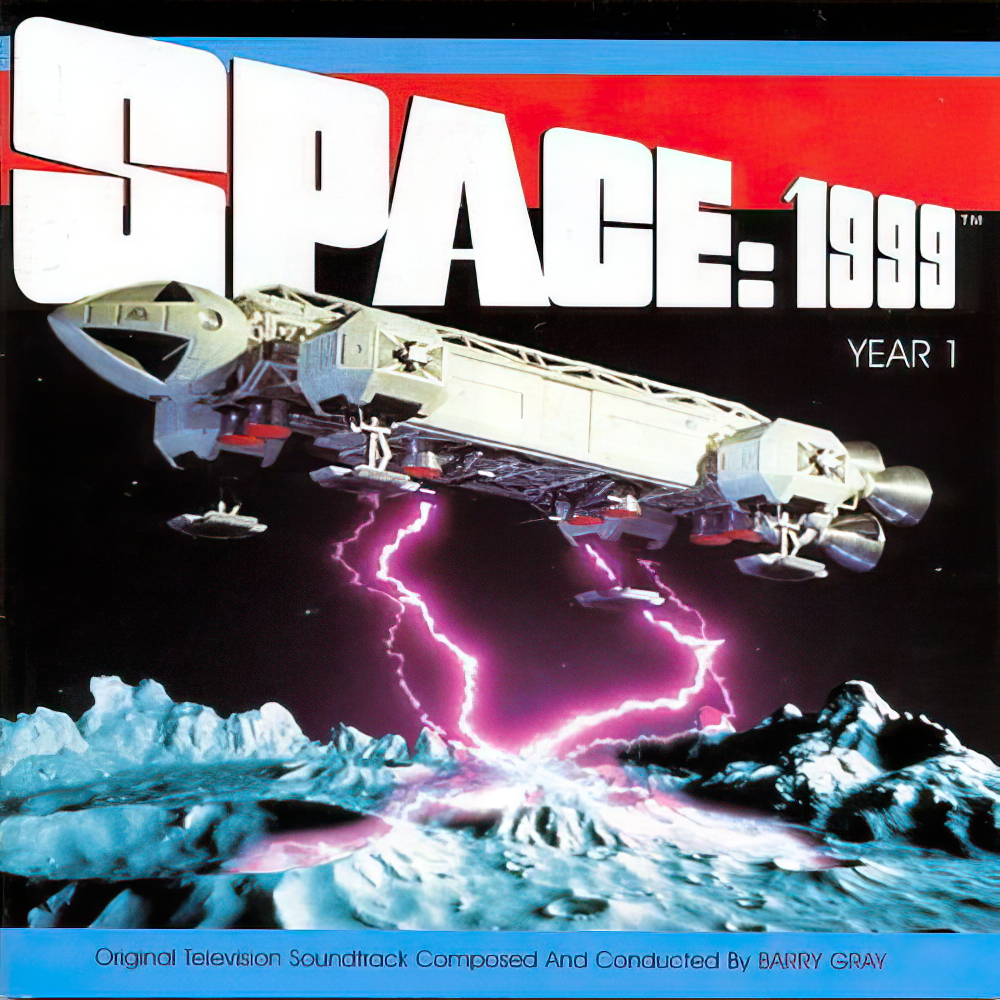
Space: 1999 Year One
If anyone were to ask me what elements from the first season of Space: 1999 were most sorely missed in the show’s second year (and trust me, I get asked this a lot…well, not really), I’d give them two names: Barry Gray and Barry Morse. Barry Morse’s character mysteriously disappeared between seasons with no explanation, never to be even so much as mentioned again. And Barry Gray’s music, which had done more to define the show’s setting and tone than anything else that could be seen or heard on screen, was swapped out for Derek Wadsworth’s more rock/disco-driven scores in the second season.
No disrespect is intended toward Wadsworth here, but I always felt that was a bad move (though I learned from this CD’s extensively detailed liner notes that it was Mr. Gray who decided to bow out at that stage). The plight of Moonbase Alpha’s crew, to put it mildly, is a hopeless one, at least so long as they’re pining for Earth. And Barry Gray’s music reflects that almost too well; it’s somber, almost tragic in places, and even in epilogue scenes that would seem to be trying to tack some kind of hopeful or light-hearted moment onto the show, the music is a reminder that these people are so screwed. Continued use of Gray’s small library of music throughout the first season reinforced that better than anything that the writers and actors did. In a show where the cast occasionally served overbaked ham to the audience, where the special effects sometimes jarringly reminded one of producer Gerry Anderson’s string of puppet series, and where the plots sometimes took sharp turns right through the guard railing and off the road, Barry Gray’s music was the dramatic anchor.
Finally back in commercial release after nearly 30 years, this collection of music from Space: 1999 is pared down from an extensive 2-CD archive of every cue recorded for the show’s first season that was given an extremely limited release by the Gerry Anderson fan club, Fanderson. That double CD collection included “library” tracks not composed by Gray (i.e. Holst’s “Mars: Bringer Of War” was used to track the episode Space Brain), as well as early demos of the music Gray played for the show’s producers; a similar double CD release through Fanderson similarly chronicled Derek Wadsworth’s music for season two. Prior to the Fanderson release, whose value has skyrocketed on the collector’s market, there was an LP of music from the series released in the 1970s. Therefore, not only is this CD the first time that the Space: 1999 music has gotten a general release since the show’s heyday, but at its budget price…well, it’s nice to not have to worry about chasing down the Fanderson CDs on eBay and watching them escalate beyond the price of my next house payment. Eight pounds sterling beats a few hundred dollars anyday, and Silva Screen has my immense gratitude for that. It’s also worth noting that this CD adds material that had been unavailable during the Fanderson CD production, so completists, you still have to get this.
Things kick off with Gray’s energetic, starts-out-heroic-and-gets-downright-funky main theme for Space: 1999, co-written with Vic Elms (of The Prisoner incidental music fame). While a recent marathon review of the series on DVD brought into sharp relief how diluted my childhood memories were of the quality of the show itself, my fond memories of this theme music remain intact. I loved how the thundering tympani roll would actually start in the episode teaser itself before you actually saw the titles (shades of the build-up to the revised main theme from Farscape season 3 and 4!), and that fanfare…wow. Most of the fanfare didn’t even include the words “Space: 1999” on the screen. No, that heroic fanfare was there to tell you, prior to identifying the show, that MARTIN LANDAU and BARBARA BAIN were starring in this series! After the final blast of brass, Gray kicks into dramatic-but-funky mode with a jammin’ guitar solo (played by Elms himself) covering the highlights from “This Week’s Episode” and the recap of the fateful events of September 13th, 1999. Yes, it’s dated – very dated. But in its day, this was one of the coolest intros ever for an action-adventure show.
The healthy number of cues from the series-launching Breakaway are a reflection of how often that episode’s music turned up in later shows, and with good reason; the first 35 or so minutes of that particular show were so intentionally nervous and heavy with dread that the music does a masterful job, when re-used later, of re-establishing the underlying hopelessness of the characters’ situation. The liner notes, which I can’t say enough nice things about, reveal that Gray only scored four episodes of the show, and the music from those shows was reused in just the right places for the remainder of the season. The score for Another Time, Another Place is another winner, including a tragically sad little cue called “Flowers For Helena” which seemed to play over the epilogue of nearly every installment of the show’s first year.
Now, all of this effusive praise for Gray’s evocative music doesn’t mean that the show’s scoring didn’t occasionally go off the deep end. The cues from Testament Of Arkadia – drawn from library music, not from Gray’s scores, but included here because of that episode’s pivotal place in the show’s history – start out with a very formal classical feel, and then segue into something that sounds like a 70s peace-and-love rock jam (think of something you’d hear if you were actually budgeted to buy the world a Coke). The cue from “The Troubled Spirit” is probably the wildest track on the whole CD, and I love it. It’s an extremely well-performed electric sitar jam which essentially was the only sound hear during the unusually off-format teaser for that episode. Granted, it’s a bit of an Indian music clichè, but for contrast’s sake, I could listen to this track three times in a row easily…and can barely stomach the Beatles’ “Within You, Without You” once.
The Mission Of The Darians was tracked from library music as well, though it’s a very close match for the show’s general musical direction as established by Barry Gray. Ring Around The Moon is represented by a funky guitar/organ track composed by Vic Elms, another frequent Anderson musical collaborator (possibly by virtue of, as the liner notes reveal, being Anderson’s son-in-law).
Even if you’re unfamiliar with this series, I strongly recommend the soundtrack to you if you enjoyed the soundtrack releases for Gatchaman/Battle Of The Planets or Star Blazers/Space Battleship Yamato. It’s in much the same vein, though more string-oriented where those shows’ scores were brass-heavy, and all of  those titles together are an interesting study in television scoring in the 1970s. If you’re more accustomed to the modern-day John Williams/Jerry Goldsmith school of film scoring, there are passages here that will trip your trigger, and just as many that you’ll want to skip. But it’s definitely worth a listen. Barry Gray seemed to know better than anyone what the dramatic thrust of Space: 1999 was, and this CD is the proof.
those titles together are an interesting study in television scoring in the 1970s. If you’re more accustomed to the modern-day John Williams/Jerry Goldsmith school of film scoring, there are passages here that will trip your trigger, and just as many that you’ll want to skip. But it’s definitely worth a listen. Barry Gray seemed to know better than anyone what the dramatic thrust of Space: 1999 was, and this CD is the proof.
- Space: 1999 Main Title (1:10)
- The Dark Side Of The Moon (2:12)
- People Are Dying Up Here (4:10)
- Breakaway (4:29)
- Human Decision Required (1:42)
- Alien Attack (“The Astronauts”) composed by Mike Hankinson (4:05)
- Terra Nova (3:06)
- Phase Two (1:42)
- Matter Of Life And Death (4:18)
- Paradise Lost (0:42)
- Space: 1999 End Titles – Alternate Version (0:32)
- The Late Shift / Gwent’s Arrival / Gwent’s Farewell (5:13)
- The Solarium: “The Latest Fashion” composed by Giampiero Boneschi (1:35)
- Captives Of Triton / Moonwalk composed by Vic Elms and Alan Willis (1:41)
- Asteroid (1:50)
- Black Sun (4:25)
- Event Horizon (4:25)
- Home (1:34)
- Daria: 100 Square Miles composed by Robert Farnon / Macrocosm composed by Frank Cordell (2:13)
- Atonement composed by Jim Sullivan (2:58)
- Space: 1999 Main Theme – Extended Alternate Version (1:42)
- The Origin Of Life: Suite Appassionnata – Andante composed by Paul Bonneau and Serge Lancen / The Miracle: Picture Of Autumn composed by Jack Arel and Pierre Dutout (5:44)
- Moon Odyssey (3:57)
- Regina’s World (3:54)
- Earthbound (1:33)
- Santa Maria (7:08)
- Flowers For Helena (1:05)
- Space: 1999 End Titles (0:34)
Released by: Silva Screen
Release date: 2004
Total running time: 79:52
Lenny & Squiggy present Lenny and the Squigtones
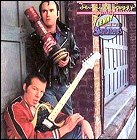 Before A Mighty Wind, before This Is Spinal Tap, there was Lenny and the Squigtones.
Before A Mighty Wind, before This Is Spinal Tap, there was Lenny and the Squigtones.
Michael McKean and David Lander first created the characters of Lenny & Squiggy (then known as Lenny & Ant’ny) while members of the comedy troupe The Credibility Gap. When they were hired as writers for the Happy Days spin-off Laverne & Shirley (along with fellow Gap member Harry Shearer) they lobbied for their creations to be included as recurring characters.
After the show had gained success, an album was released, Laverne & Shirley Sing, featuring Penny Marshall and Cindy Williams performing in character. It sold well enough to justify a follow-up featuring the show’s other duo. On the show Lenny and Squiggy had often been shown performing with their band Lenny and the Squigtones, so an album by the erstwhile greasers actually made more sense than one by two bottling plant employees. Lenny & Squiggy present Lenny and the Squigtones is presented in the form of a concert and was, in fact, recorded live at the Roxy in Los Angeles. McKean and Lander stay in character throughout. The only thing that breaks the fourth wall is a joke that revolves around the “Happy Days gang” and a musical version of “In Cold Blood”.
The comedy shows an edge to the characters that is, no doubt, more in line with the original Credibility Gap version than the tamer presentation seen on Laverne & Shirley. The between-song sketches are perfectly tailored to the actors and they never fail to milk the most out of the jokes.
The music is also top-notch, expertly capturing an authentic 1950’s feel. Like the music in This Is Spinal Tap and A Mighty Wind, the songs never make fun of the style, but have fun with it. And in an interesting connection to Spinal Tap (the one that lands this in the Tap canon), Christopher Guest plays guitar for the band and is credited in the liner notes as Nigel Tufnel. His guitar work is actually noticeable, most clearly on “Foreign Legion Of Love”, which bears distinct similarities to Spinal Tap’s “Stonehenge” and “Clam Caravan”.
 Run, don’t walk, to your favorite record store to get Lenny & Squiggy present Lenny and the Squigtones. Then walk quietly home when you realize it’s long out of print, extremely difficult to find and darn expensive if you do. But by whatever means you employ, you must find this album. No fan of the Spinal Tap genre of recordings should be without it.
Run, don’t walk, to your favorite record store to get Lenny & Squiggy present Lenny and the Squigtones. Then walk quietly home when you realize it’s long out of print, extremely difficult to find and darn expensive if you do. But by whatever means you employ, you must find this album. No fan of the Spinal Tap genre of recordings should be without it.
- Vamp On* (:50)
- Night After Night (2:30)
- Creature Without A Head (3:49)
- King Of The Cars (2:11)
- Squiggy’s Wedding Day (5:55)
- Love Is A Terrible Thing (2:52)
- Babyland* (For Eva Squigman) (3:16)
- (If Only I Had Listened To) Mama (2:10)
- So’s Your Old Testament* (1:29)
- Sister-In-Law (3:05)
- Honor Farm* (2:08)
- Starcrossed (2:59)
- Only Women Cry* (1:30)
- Foreign Legion of Love (4:20)
- Vamp Off* (:36)
note: tracks with a (*) are spoken word tracksReleased by: Casablanca
Release date: 1979
Total running time: 39:40
Roy Wood – Starting Up
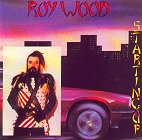 The year is 1985. Euro-pop has taken hold, but is rapidly giving way to watered-down hard rock “hair” bands. And despite having a fine and, it must be said, multi-colored head of hair, if you’re old school rocker Roy Wood (founding member of The Move and ELO), you fit into neither of these categories.
The year is 1985. Euro-pop has taken hold, but is rapidly giving way to watered-down hard rock “hair” bands. And despite having a fine and, it must be said, multi-colored head of hair, if you’re old school rocker Roy Wood (founding member of The Move and ELO), you fit into neither of these categories.
Not that he didn’t try, mind you. Woody’s always been an advocate of reinventing his sound, of trying to do something that either hasn’t been done before in rock ‘n’ roll or trying to bring back something that’s fallen out of favor. After trying to give rock music a full-time string section with Electric Light Orchestra, he moved on to create groups like Wizzard and Helicopters, centered around a 50s-style wall-of-saxophone sound. (It’s this last permutation that seems to have stuck, as Wood still tours to this day with Roy Wood’s Big Band.) But in ’84, Wood returned briefly to what he did with his underrated 1975 classic Boulders – recording everything by himself – only with much more modern tools at his disposal.
The sole drawback to this: Starting Up probably could have charted in 1980 or 1981, when the sound of synths and drum machines was fresh where the mainstream was concerned. And Wood’s voice isn’t a million miles away from, say, Gary Numan’s. It wouldn’t have been a bad fit for the early days of synth pop. But in 1985, most of the songs on this album already sounded dated, and 20 years later, time hasn’t been much kinder to them.
Oddly enough, one of the only two tracks that stand head and shoulders above the rest suffers (or perhaps benefits) from a near-total sonic disconnect from every other song on the album. Featuring Louis Clark (of Hooked On Classics fame, and longtime orchestral arranger for ELO) and a full orchestra backing, “On Top Of The World” is a catchy song with a snazzy tune, and easily Wood’s best vocals on the whole album. It’s like this song dropped in from a better-written, better-produced album that we’ve never gotten to hear. The other standout track, “Turn Your Body To The Light”, is a nice melding of synths and Wood’s trademark sax, and it’s a catchy tune too. These two songs easily eclipse the rest of the album.
And let’s set one thing straight – drum machines alone don’t doom a song to cheesiness. Two demos Wood recorded with old friend and former bandmate Jeff Lynne circa 1990 have leaked out, very simple, low-tech productions showcasing a couple of beautifully written nuggets of rock ‘n’ roll that most of the world has never gotten to hear. And that’s what Starting Up is really missing: well-written songs. This is the same Roy Wood who gave us “Blackberry Way” and “Fire Brigade” back in the Move days, and has peppered his solo career with lesser-known but equally-worthwhile songs like “Dear Elaine”…not that you could tell from listening to Starting Up. To put the cards on the table: his songs this time around either weren’t as inspired, or the intent got lost in the execution.
 A real curate’s egg, this one, and it’s also Woody’s last solo album to date. Considering what his former bandmate was able to accomplish with Zoom under the ELO banner, I’d really like to hear Roy Wood come back and zing us with a solo project now. Because, as hard as I’m sure he tried to accomplish something unique with Starting Up, he’d almost certainly do better with the technology and techniques available today…and he’s had time to write some new songs too.
A real curate’s egg, this one, and it’s also Woody’s last solo album to date. Considering what his former bandmate was able to accomplish with Zoom under the ELO banner, I’d really like to hear Roy Wood come back and zing us with a solo project now. Because, as hard as I’m sure he tried to accomplish something unique with Starting Up, he’d almost certainly do better with the technology and techniques available today…and he’s had time to write some new songs too.
- Red Cars Are After Me (3:56)
- Raining In The City (4:17)
- Under Fire (4:24)
- Turn Your Body To The Light (4:31)
- Hot Cars (3:13)
- Starting Out (3:20)
- Keep It Steady (3:49)
- On Top Of The World (3:30)
- Ships In The Night (5:04)
Released by: Castle
Release date: 1985
Total running time: 36:04
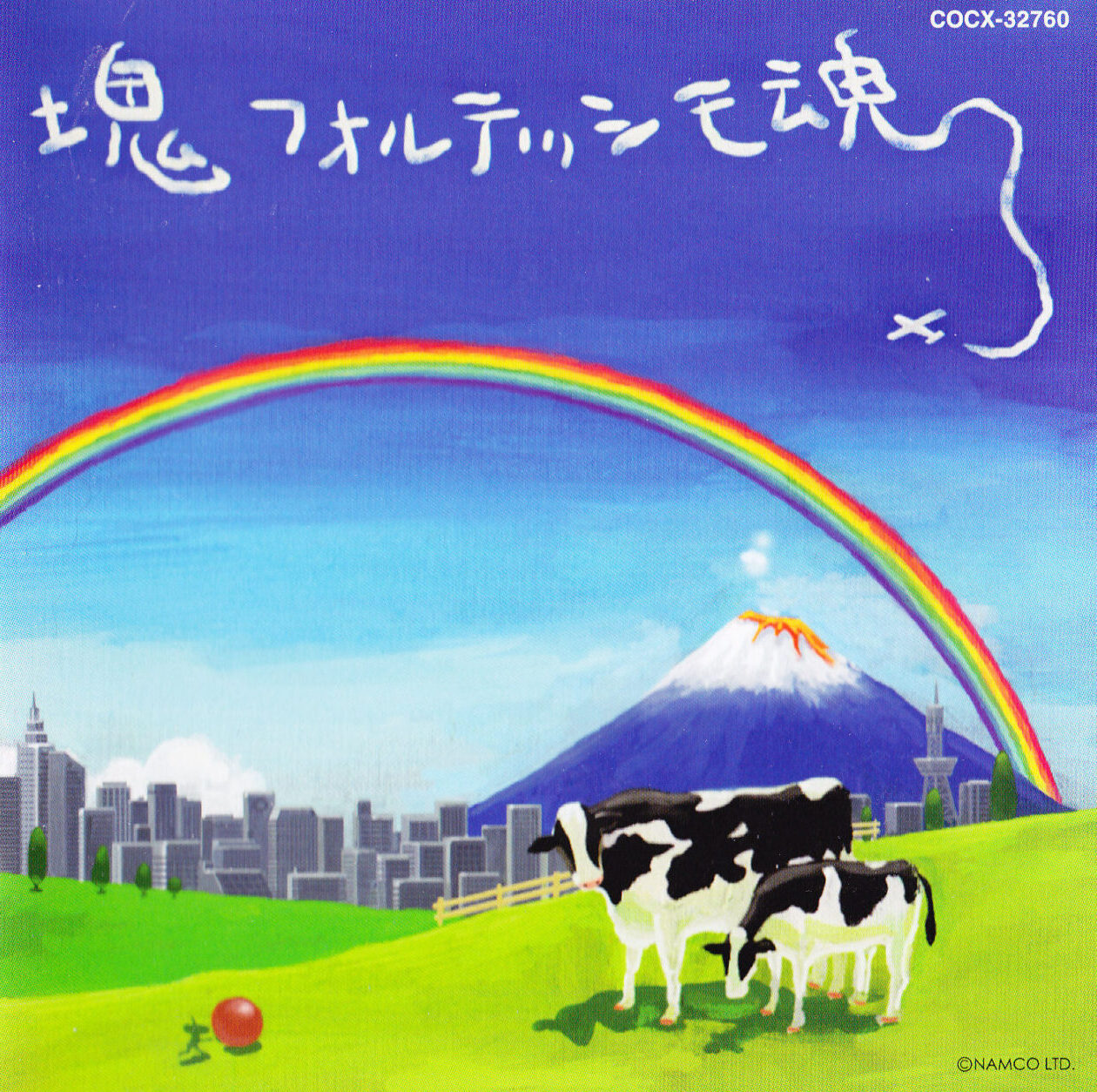
Katamari Fortissimo Damacy
The soundtrack to an almost unreasonably fun video game, Katamari Fortissimo Damacy is one of the most varied soundtracks I’ve ever heard to any multimedia entity, and it’s also one of the few soundtracks consisting of the works of multiple artists that I’ve ever heard rise to this level.
To give just a little bit of background on the game itself, Katamari Damacy is a Japanese import from Namco, the folks who brought us Pac-Man, Dig Dug and other almost illegally addictive video games down through the ages. You control a diminutive Prince, whose father, the King of All Cosmos, has apparently obliterated all the stars in the sky. You’re sent on a mission to create “katamari” – balls of objects all rolled up into a big clump. In the early stages of the game, you pick up pencils and paper clips and other small objects, but if you’re good enough you can eventually roll your katamari over entire oceans, picking up giant squids and islands. Nothing is safe. Everything can be accumulated. But if you try to pick up something that your katamari simply doesn’t have the mass and momentum to accumulate, you’ll either dislodge a few precious items from it – or lose it altogether. The object is to grow the katamari big enough to launch it into the night sky as a new star.
This zany, cartoony fun takes place against the backdrop of some simply wonderful music, making the package even better. (I highly recommend the game too – unsure of whether or not anyone outside of the Far East would “get it,” Namco dumped this game in the U.S. at a budget price of $20 and it promptly sold out its first print run just on word of mouth alone.) The music is whimsical, light-hearted, and has a great energy to it. Few CDs have made me smile as much while listening as this one does on a regular basis.
Yu Miyake’s “Katamari On The Rock” serves as a recurring motif throughout the various songs, and it’s as versatile a tune as you could ask for. Not every song features that element, though. Highlights range from the J-pop stylings of “Lonely Rolling Star”, “You Are Smart” and “The Moon And The Prince”, to the almost Sinatra-esque “Que Sera Sera”, to the New York jazz-flavored “A Crimson Rose And A Gin & Tonic”, to the meandering remixed guitar of “Angel Flavor’s Present”, to a Michael Bolton-style power ballad called “Katamari Love”, to “Last Samba”, which sounds a bit like someone’s been listening to John Williams’ Naboo celebration from the end of Star Wars Episode I. That every syllable of every lyric on the album is sung in Japanese doesn’t diminish my enjoyment of it one bit. Frankly, if anything, this CD gives me a nice, long list of artists whose other works I’ll be keeping an eye out for, if their work here is any indication of their usual output.
 It’s a wildly infectious listening experience and, like the game itself, it has the almost inexplicable effect of brightening my day every time I come into contact with it. It’s almost hard to explain. Even harder to explain is how Namco might possibly top this collection of music for the upcoming sequel, Everybody Loves Katamari Damacy. My first Damn Near Perfect Album List addition in a long, long time. Katamari Fortissimo Damacy is that good.
It’s a wildly infectious listening experience and, like the game itself, it has the almost inexplicable effect of brightening my day every time I come into contact with it. It’s almost hard to explain. Even harder to explain is how Namco might possibly top this collection of music for the upcoming sequel, Everybody Loves Katamari Damacy. My first Damn Near Perfect Album List addition in a long, long time. Katamari Fortissimo Damacy is that good.
- Nananan Katamari performed by Yu Miyake & Yuusama (1:21)
- Katamari On The Rock: Main Theme performed by Yu Miyake & Masayuki Tanaka (5:57)
- Overture performed by Yu Miyake & Asuka Sakai (0:49)
- The Moon And The Prince performed by Kenji Ninuma & Akitaka Tohyama (5:30)
- Fugue #7777 performed by Asuka Sakai (1:22)
- Lonely Rolling Star performed by Yohihito Yano & Saki Kabata (5:44)
- The Wonderful Star’s Walk Is Wonderful performed by Yuri Misumi (3:12)
- Katamari Mambo (Katamari Syndrome mix) performed by Nobue Matsubara, Yuri Misumi & Sakamoto-chan (5:35)
- You Are Smart performed by Akitaka Tohyama (3:32)
- A Crimson Rose And A Gin & Tonic performed by Ado Mizumori & Asuka Sakai (4:29)
- Wanda Wanda performed by Yu Miyake (3:23)
- Que Sera Sera performed by Charlie Kosei & Asuka Sakai (5:31)
- Angel Flavor’s Present performed by Yu Miyake (5:08)
- Katamaritaino performed by Yui Asaka & Hideki Tobeta (5:54)
- Katamari Stars performed by Hideki Tobeta (2:28)
- Cherry Blossom Color Season performed by Yu Miyake & Katamari Company Jr. (6:14)
- Lovely Angel performed by Yu Miyake (1:27)
- Stardust Fanfare performed by Akitaka Tohyama (0:08)
- Last Samba performed by Yu Miyake, Asuka Sakai & Katamari Samba Company (1:00)
- Katamari Love (Ending Theme) performed by Shigeru Matsuzaki & Yohihito Yano (4:09)
- Katamari March Damacy performed by Yu Miyake (2:21)
Released by:
Release date:
Total running time:
Man On The Moon – music by R.E.M.
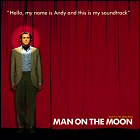 This soundtrack is an odd bird. There’s a smattering of clips from R.E.M.’s film score, a few songs from the band, a couple of performances by Jim Carrey as Andy Kaufman/Tony Clifton, a handful of pieces of source music from significant Kaufman appearances, and one song that doesn’t fit any of these categories but does show up briefly in the movie. I’m sure there’s an audience for each category, but I have to think their intersection is a very small group.
This soundtrack is an odd bird. There’s a smattering of clips from R.E.M.’s film score, a few songs from the band, a couple of performances by Jim Carrey as Andy Kaufman/Tony Clifton, a handful of pieces of source music from significant Kaufman appearances, and one song that doesn’t fit any of these categories but does show up briefly in the movie. I’m sure there’s an audience for each category, but I have to think their intersection is a very small group.
I remember thinking the score did a good job fitting the movie when I saw it, but it’s hard to get much sense of it from any of these clips. Most of them are about two minutes long, so there’s no time for them to really build a mood. I do particularly like “Miracle” and “Milk And Cookies”, which come from the tail end of the film as Kaufman deals with his impending death and his performance at Carnegie Hall – there’s a bittersweet resignation to the music that conveys the sentiment of the plot quite well. An orchestral version of “Man On The Moon” is good, but almost unrecognizable – it was only when I got the DVD-Audio version of Automatic For The People that I recognized a few elements from the song that had made the transition.
The original “Man On The Moon” is one of three R.E.M. performances on the album. Of those, “The Great Beyond” is the only new composition. It’s one of my favorite songs of the band’s three-piece period, thoughtful and mellow but still up-tempo enough to have some energy to it. The guitar-bass-keyboard combo provides an atmospheric backdrop to Michael Stipe’s verses and then kicks into gear with a fuller sound, including some strings, in the choruses. Unfortunately, like almost every other track on this album, it’s marred by the inclusion of dialogue clips from the movie. The third performance, “This Friendly World”, features Carrey singing along with Stipe as both Kaufman and Clifton. It’s amusing, especially when Carrey/Kaufman demands that he and Stipe sing every other word of one verse.
Carrey/Clifton also absolutely butchers “I Will Survive”. Since that’s what he’s setting out to do, I’ll call this one a highly successful failure. “Rose Marie” and “One More Song for You” are original Kaufman performances from the archives, and the man could carry a tune quite well, but they’re probably more memorable for novelty value – “Hey, Latka can sing!” Bob James’ theme from Taxi, “Angela”, fits in rather well with the other instrumental pieces. It’s understated but I think it holds up rather well as one of TV’s most memorable instrumental themes. The Sandpipers’ “Mighty Mouse Theme” is another fun and obvious piece of source music.
As for Exile’s “Kiss You All Over” . . . I got nothin’.
 The problem is that the album is both schizophrenic and short. There’s not enough orchestral music for this to appeal to fans of film scores, there’s not enough comedy for humor fans, and there’s not enough original Kaufman material to appeal to his fans. Once upon a time, the presence of “The Great Beyond” might have made this somewhat worthwhile for R.E.M. fans, but now you can get that song without the film dialogue on the band’s Warner Bros. best-of, and “Man On The Moon” is there as well. But if you’re looking for eclectic eccentricity, this might work for you.
The problem is that the album is both schizophrenic and short. There’s not enough orchestral music for this to appeal to fans of film scores, there’s not enough comedy for humor fans, and there’s not enough original Kaufman material to appeal to his fans. Once upon a time, the presence of “The Great Beyond” might have made this somewhat worthwhile for R.E.M. fans, but now you can get that song without the film dialogue on the band’s Warner Bros. best-of, and “Man On The Moon” is there as well. But if you’re looking for eclectic eccentricity, this might work for you.
- Mighty Mouse Theme (Here I Come to Save the Day) – The Sandpipers (song) (1:53)
- The Great Beyond – R.E.M. (song) (5:22)
- Kiss You All Over – Exile (song) (3:37)
- Angela (Theme from Taxi) – Bob James (instrumental song) (1:27)
- Tony Thrown Out – R.E.M. (score) (1:07)
- Man on the Moon – R.E.M. (song) (5:13)
- This Friendly World – R.E.M. and Jim Carrey (song) (3:03)
- Miracle – R.E.M. (score) (2:53)
- Lynne and Andy – R.E.M. (score) (1:46)
- Rose Marie – Andy Kaufman (song) (2:36)
- Andy Gets Fired – R.E.M. (score) (1:07)
- I Will Survive – Tony Clifton (song) (1:49)
- Milk & Cookies – R.E.M. (score) (1:59)
- Man on the Moon (Orchestral) – R.E.M. (score) (1:51)
- One More Song for You – Andy Kaufman (score) (1:16)
Released by: Warner Bros.
Release date: 1999
Total running time: 37:08
